
IN THE COURT OF CHANCERY OF THE STATE OF DELAWARE ARKANSAS TEACHER RETIREMENT SYSTEM, on Behalf of Itself and All Others Similarly Situated, Plaintiff, v. ALON USA ENERGY, INC., DELEK US HOLDINGS, INC., DELEK HOLDCO, INC., DIONE MERGECO, INC., ASTRO MERGECO, INC., EZRA UZI YEMIN, ILAN COHEN, ASSAF GINZBURG, FREDEREC GREEN, RON W. HADDOCK, WILLIAM J. KACAL, ZALMAN SEGAL, MARK D. SMITH, AVIGAL SOREQ, FRANKLIN WHEELER, and DAVID WIESSMAN, Defendants. C.A. No. _____-_____ VERIFIED CLASS ACTION COMPLAINT Plaintiff Arkansas Teacher Retirement System (“Plaintiff”), by and through its attorneys, brings this Verified Class Action Complaint (the “Complaint”) on its own behalf and on behalf of a class of all holders of Alon USA Energy, Inc. (“Alon” or the “Company”) common stock, other than Defendants and their affiliates, against the Board of Directors (the “Board”) of Alon and the controlling EFiled: Jun 15 2017 04:10PM EDT Transaction ID 60736780 Case No. 2017-0453-
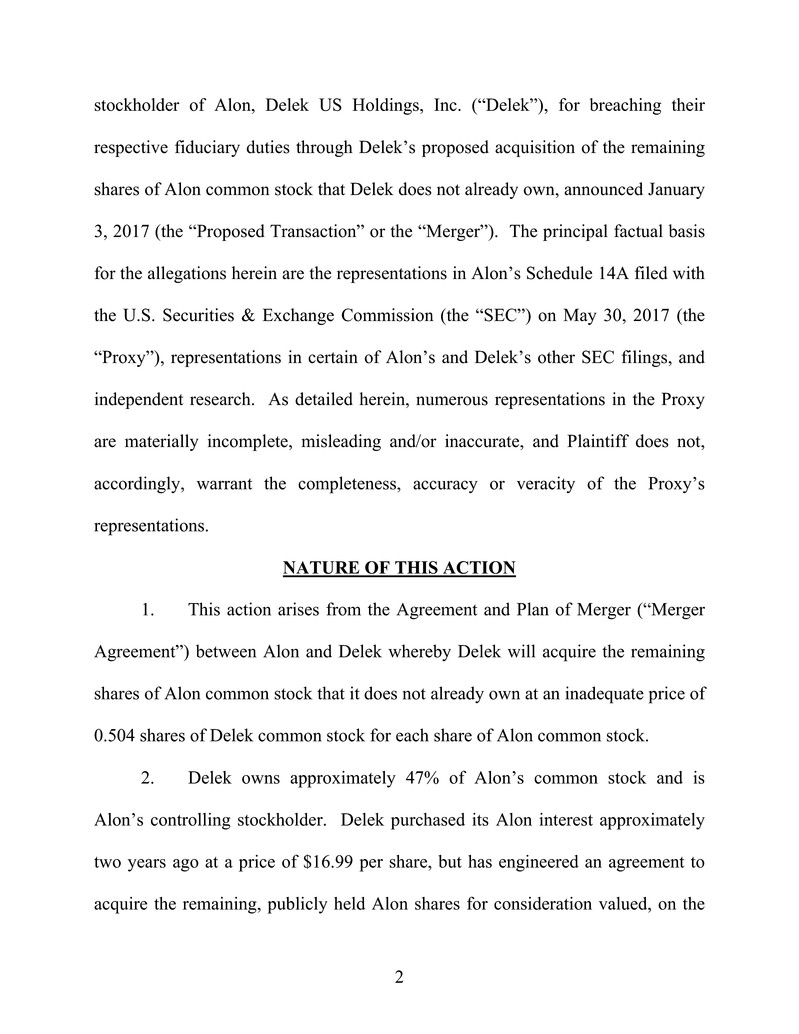
2 stockholder of Alon, Delek US Holdings, Inc. (“Delek”), for breaching their respective fiduciary duties through Delek’s proposed acquisition of the remaining shares of Alon common stock that Delek does not already own, announced January 3, 2017 (the “Proposed Transaction” or the “Merger”). The principal factual basis for the allegations herein are the representations in Alon’s Schedule 14A filed with the U.S. Securities & Exchange Commission (the “SEC”) on May 30, 2017 (the “Proxy”), representations in certain of Alon’s and Delek’s other SEC filings, and independent research. As detailed herein, numerous representations in the Proxy are materially incomplete, misleading and/or inaccurate, and Plaintiff does not, accordingly, warrant the completeness, accuracy or veracity of the Proxy’s representations. NATURE OF THIS ACTION 1. This action arises from the Agreement and Plan of Merger (“Merger Agreement”) between Alon and Delek whereby Delek will acquire the remaining shares of Alon common stock that it does not already own at an inadequate price of 0.504 shares of Delek common stock for each share of Alon common stock. 2. Delek owns approximately 47% of Alon’s common stock and is Alon’s controlling stockholder. Delek purchased its Alon interest approximately two years ago at a price of $16.99 per share, but has engineered an agreement to acquire the remaining, publicly held Alon shares for consideration valued, on the

3 Merger’s announcement, at only $12.13 per share. This unfairly low price is the result of a deeply flawed process through which the Alon Board, and a supposed special committee thereof, agreed to sell Delek the remainder of Alon that Delek does not already own for 28.6% less than what Delek originally paid for its Alon stake. 3. The seeds for the Proposed Transaction were sown in March 2014, when Delek and Alon Israel Oil Company, Ltd. (“Alon Israel”) began discussions regarding the possible acquisition by Delek of Alon Israel’s shares of Company common stock. After Delek acquired Alon Israel’s stake in Alon in May 2015, Delek and Alon’s Chairman, defendant Ezra Uzi Yemin (“Yemin”), told Delek investors on quarterly earnings calls that Delek, inevitably, would buy out the other Alon stockholders. While Delek had a stockholder agreement with Alon that provided certain limited standstill protections, Alon’s public stockholders were otherwise exposed to Delek’s control position. 4. The Proxy says that the Board formed a special committee of purportedly independent directors in 2015 that, while formed to respond to a proposal from Delek, was actually delegated only the power to engage advisors and possessed only that power until late October 2016 (the “Special Committee”). The Special Committee, according to the Proxy, chased down Delek for more than a year and a half and pushed for Delek’s buyout of the publicly held Alon shares.
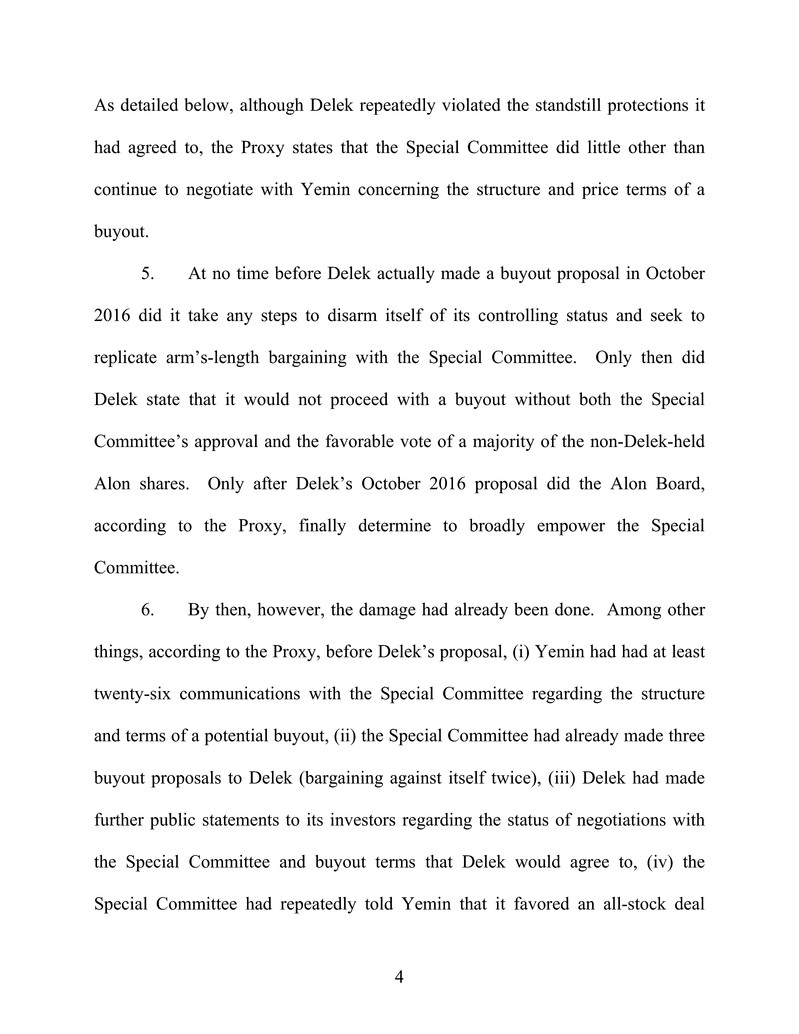
4 As detailed below, although Delek repeatedly violated the standstill protections it had agreed to, the Proxy states that the Special Committee did little other than continue to negotiate with Yemin concerning the structure and price terms of a buyout. 5. At no time before Delek actually made a buyout proposal in October 2016 did it take any steps to disarm itself of its controlling status and seek to replicate arm’s-length bargaining with the Special Committee. Only then did Delek state that it would not proceed with a buyout without both the Special Committee’s approval and the favorable vote of a majority of the non-Delek-held Alon shares. Only after Delek’s October 2016 proposal did the Alon Board, according to the Proxy, finally determine to broadly empower the Special Committee. 6. By then, however, the damage had already been done. Among other things, according to the Proxy, before Delek’s proposal, (i) Yemin had had at least twenty-six communications with the Special Committee regarding the structure and terms of a potential buyout, (ii) the Special Committee had already made three buyout proposals to Delek (bargaining against itself twice), (iii) Delek had made further public statements to its investors regarding the status of negotiations with the Special Committee and buyout terms that Delek would agree to, (iv) the Special Committee had repeatedly told Yemin that it favored an all-stock deal
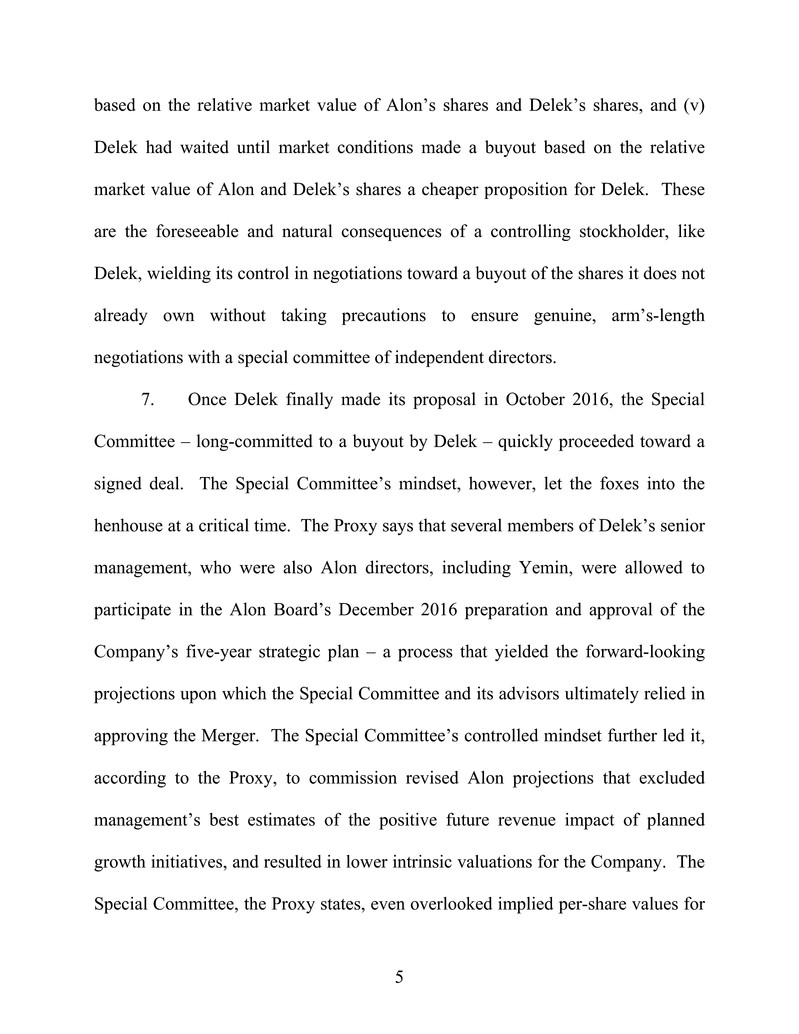
5 based on the relative market value of Alon’s shares and Delek’s shares, and (v) Delek had waited until market conditions made a buyout based on the relative market value of Alon and Delek’s shares a cheaper proposition for Delek. These are the foreseeable and natural consequences of a controlling stockholder, like Delek, wielding its control in negotiations toward a buyout of the shares it does not already own without taking precautions to ensure genuine, arm’s-length negotiations with a special committee of independent directors. 7. Once Delek finally made its proposal in October 2016, the Special Committee – long-committed to a buyout by Delek – quickly proceeded toward a signed deal. The Special Committee’s mindset, however, let the foxes into the henhouse at a critical time. The Proxy says that several members of Delek’s senior management, who were also Alon directors, including Yemin, were allowed to participate in the Alon Board’s December 2016 preparation and approval of the Company’s five-year strategic plan – a process that yielded the forward-looking projections upon which the Special Committee and its advisors ultimately relied in approving the Merger. The Special Committee’s controlled mindset further led it, according to the Proxy, to commission revised Alon projections that excluded management’s best estimates of the positive future revenue impact of planned growth initiatives, and resulted in lower intrinsic valuations for the Company. The Special Committee, the Proxy states, even overlooked implied per-share values for

6 Alon generated by its financial advisor’s discounted cash flow and other valuation analyses that ranged wholly above the $12.13 value ultimately agreed-to with Delek – a clear indication that the Merger price is unfair to the Alon public stockholders. 8. The Special Committee and Delek ultimately agreed to an all-stock Merger in which each Alon share will be, effectively, exchanged for 0.504 shares of Delek, with Alon stockholders to own approximately 24% of the combined company. Confirming that the Special Committee eschewed any reliance on Alon’s intrinsic per-share value in agreeing to the Merger, there is no price collar to protect Alon’s public stockholders from downward price movements in Delek’s stock and guarantee them a firm per-share dollar-value for their Alon stock. 9. While the Merger Agreement conditions the Proposed Transaction on the approval of a majority of Alon shares not owned by Delek, even that protection has been diluted in the Proposed Transaction. In conjunction with the Merger, two Alon insiders—Special Committee chairman David Wiessman (“Wiessman”) and Company executive and former director Jeff Morris—entered into agreements with Delek to vote their Alon shares in support of the Merger. These voting agreements lock in approximately 11.6% of the unaffiliated publicly held shares in support of the Merger and will count towards the “majority-of-the-unaffiliated” vote condition.

7 10. Further, the Special Committee is not composed of solely independent directors, despite the Proxy’s contrary representations. Wiessman, the Special Committee chairman who the Proxy indicates led discussions with Yemin, has material financial interests in Delek through his investments in Alon Israel, which received millions of shares of Delek stock in exchange for its Alon shares in May 2015 and is Delek’s largest stockholder. Additionally, Delek took advantage of its controlling stockholder position and effectively appointed two directors of its choosing to the Special Committee in the midst of negotiations with the Special Committee. Thus, at least three members of the six-director Special Committee are not independent of Delek. 11. The Special Committee process was further tainted by the retention of J.P. Morgan Securities LLC (“JP Morgan”), which has undisclosed material conflicts of interest in serving as the committee’s financial advisor. JP Morgan’s affiliates currently own approximately 2.33% of Delek’s common stock. Those affiliates actually increased their holdings in Delek by almost 60% between August 8, 2016 and November 4, 2016, beneficially owning 2.5% of Delek’s total outstanding shares when the Merger was announced. The Proxy omits these material facts. The Special Committee’s failure to retain a financial advisor without material financial ties to Delek is inexcusable. Indeed, the Proxy says nothing about whether the Special Committee knew of this conflict when

8 considering financial advisors, or whether the Special Committee took any steps to manage this conflict of interest throughout JP Morgan’s engagement. 12. The Proxy, as detailed below, is materially incomplete, incorrect and misleading in several additional respects as well. Alon’s public stockholders, therefore, will be unable to cast fully informed votes at the scheduled June 28, 2017 special stockholder’s meeting called by the Board to vote on the Merger and related proposals (the “Special Meeting”). 13. The Proposed Transaction is subject to entire fairness review. It promises an unfair price to Alon’s public stockholders. It resulted from an unfair process that bore no resemblance to genuine arm’s-length negotiations and was deeply influenced by Delek’s controlling stockholder status. Because the Proposed Transaction is not entirely fair, Alon’s public stockholders are entitled to equitable relief. PARTIES 14. Plaintiff is and has been a stockholder of Alon at all relevant times and has continuously held shares since the announcement of the Proposed Transaction, and will continue to hold its shares at all times relevant to this action. 15. Defendant Alon is a Delaware corporation headquartered in Dallas, Texas. The Company has approximately 71.6 million shares of common stock outstanding, and the Proposed Transaction values the Company at approximately

9 $868 million. Alon is an independent retailer and marketer of petroleum products, operating primarily in the South Central, Southwestern, and Western United States. The Company owns several crude oil refineries in Texas, Louisiana, and California. Alon is also a leading marketer of asphalt, which it distributes primarily through asphalt terminals located throughout the Western and Southwestern United States. Alon operates its wholesale marketing and certain refining operations through Alon USA Partners, LP (the “Partnership”), a master limited partnership. Alon owns 100% of Alon USA Partners GP, LLC, a Delaware limited liability company and the Partnership’s general partner. Alon also owns approximately 81.6% of the Partnership’s limited partnership interests. Additionally, the Company is the largest 7-Eleven licensee in the United States and operates approximately 300 7-Eleven branded convenience stores and gas stations in Texas and New Mexico. The Company is publicly traded on the New York Stock Exchange under the ticker symbol “ALJ.” 16. Defendant Delek is Alon’s controlling stockholder. It acquired its roughly 47% interest in the Company on May 14, 2015, when it purchased 33.7 million shares of the Company from Alon Israel, for which it paid $572.4 million, or approximately $16.99 per share. Delek, also a Delaware corporation, maintains its headquarters in Brentwood, Tennessee. Delek is a diversified downstream energy company with assets in petroleum refining, storage, transportation,
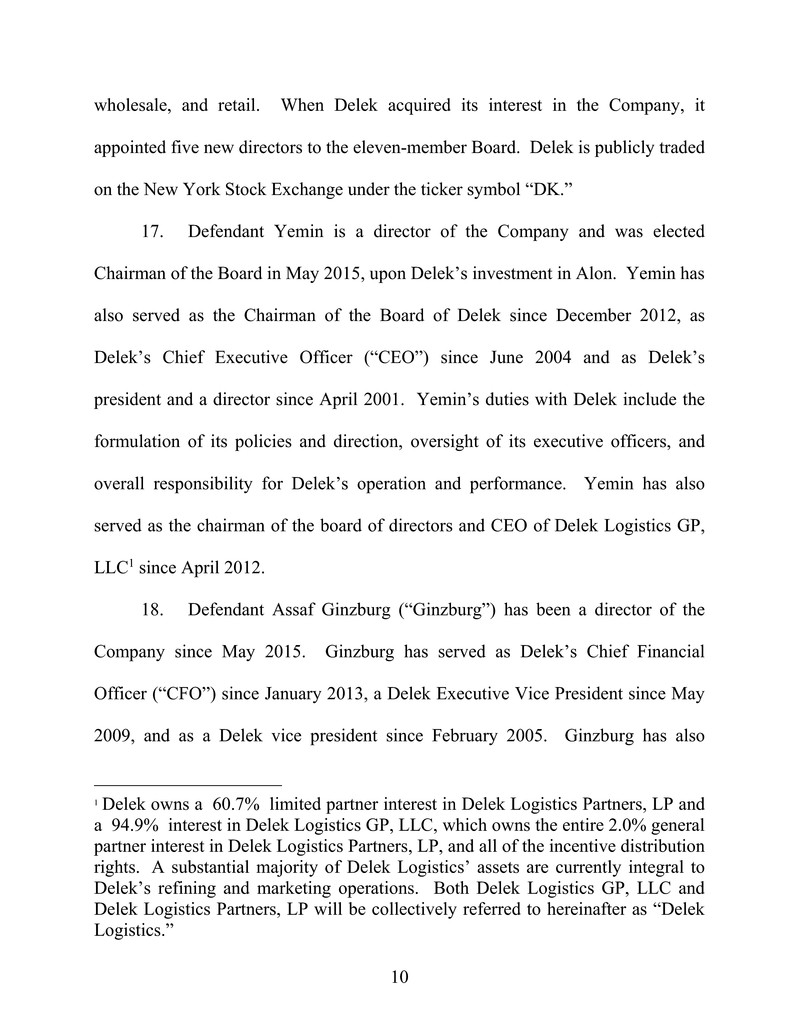
10 wholesale, and retail. When Delek acquired its interest in the Company, it appointed five new directors to the eleven-member Board. Delek is publicly traded on the New York Stock Exchange under the ticker symbol “DK.” 17. Defendant Yemin is a director of the Company and was elected Chairman of the Board in May 2015, upon Delek’s investment in Alon. Yemin has also served as the Chairman of the Board of Delek since December 2012, as Delek’s Chief Executive Officer (“CEO”) since June 2004 and as Delek’s president and a director since April 2001. Yemin’s duties with Delek include the formulation of its policies and direction, oversight of its executive officers, and overall responsibility for Delek’s operation and performance. Yemin has also served as the chairman of the board of directors and CEO of Delek Logistics GP, LLC1 since April 2012. 18. Defendant Assaf Ginzburg (“Ginzburg”) has been a director of the Company since May 2015. Ginzburg has served as Delek’s Chief Financial Officer (“CFO”) since January 2013, a Delek Executive Vice President since May 2009, and as a Delek vice president since February 2005. Ginzburg has also 1 Delek owns a 60.7% limited partner interest in Delek Logistics Partners, LP and a 94.9% interest in Delek Logistics GP, LLC, which owns the entire 2.0% general partner interest in Delek Logistics Partners, LP, and all of the incentive distribution rights. A substantial majority of Delek Logistics’ assets are currently integral to Delek’s refining and marketing operations. Both Delek Logistics GP, LLC and Delek Logistics Partners, LP will be collectively referred to hereinafter as “Delek Logistics.”
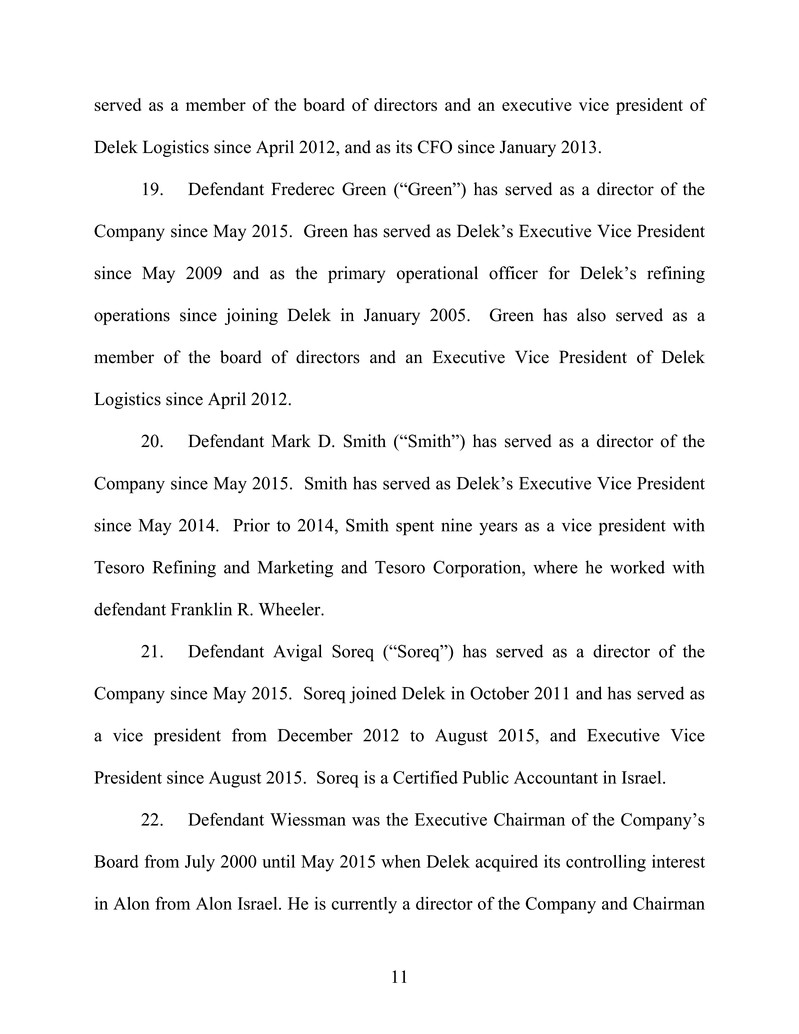
11 served as a member of the board of directors and an executive vice president of Delek Logistics since April 2012, and as its CFO since January 2013. 19. Defendant Frederec Green (“Green”) has served as a director of the Company since May 2015. Green has served as Delek’s Executive Vice President since May 2009 and as the primary operational officer for Delek’s refining operations since joining Delek in January 2005. Green has also served as a member of the board of directors and an Executive Vice President of Delek Logistics since April 2012. 20. Defendant Mark D. Smith (“Smith”) has served as a director of the Company since May 2015. Smith has served as Delek’s Executive Vice President since May 2014. Prior to 2014, Smith spent nine years as a vice president with Tesoro Refining and Marketing and Tesoro Corporation, where he worked with defendant Franklin R. Wheeler. 21. Defendant Avigal Soreq (“Soreq”) has served as a director of the Company since May 2015. Soreq joined Delek in October 2011 and has served as a vice president from December 2012 to August 2015, and Executive Vice President since August 2015. Soreq is a Certified Public Accountant in Israel. 22. Defendant Wiessman was the Executive Chairman of the Company’s Board from July 2000 until May 2015 when Delek acquired its controlling interest in Alon from Alon Israel. He is currently a director of the Company and Chairman
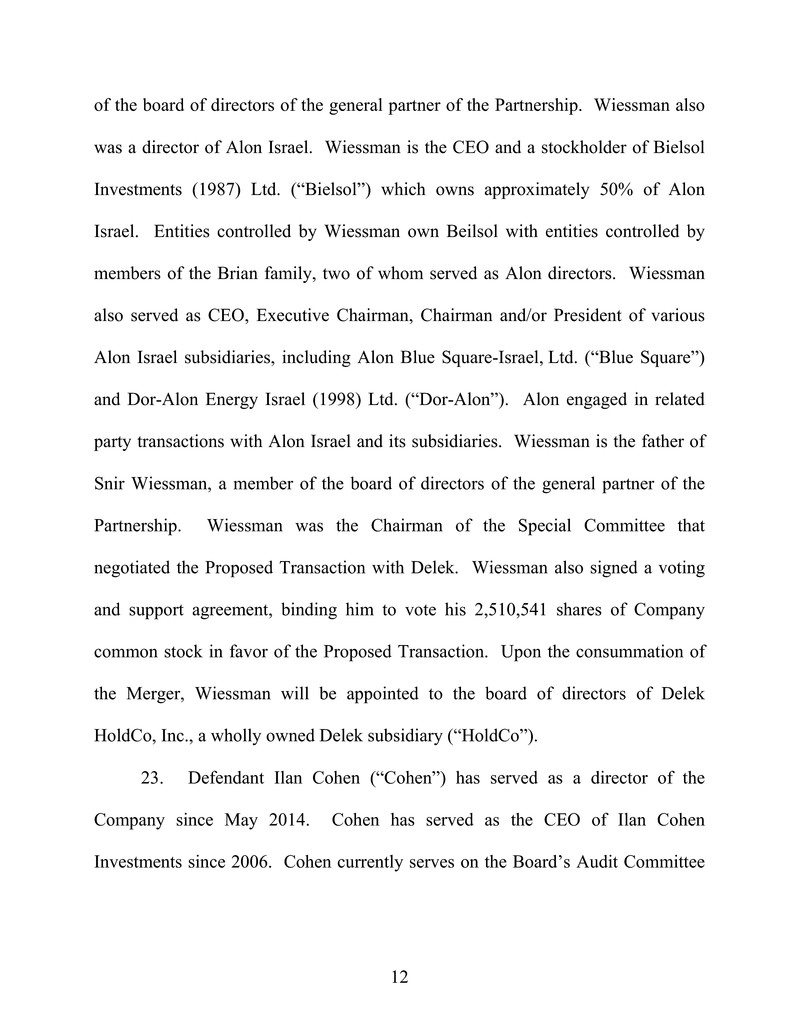
12 of the board of directors of the general partner of the Partnership. Wiessman also was a director of Alon Israel. Wiessman is the CEO and a stockholder of Bielsol Investments (1987) Ltd. (“Bielsol”) which owns approximately 50% of Alon Israel. Entities controlled by Wiessman own Beilsol with entities controlled by members of the Brian family, two of whom served as Alon directors. Wiessman also served as CEO, Executive Chairman, Chairman and/or President of various Alon Israel subsidiaries, including Alon Blue Square-Israel, Ltd. (“Blue Square”) and Dor-Alon Energy Israel (1998) Ltd. (“Dor-Alon”). Alon engaged in related party transactions with Alon Israel and its subsidiaries. Wiessman is the father of Snir Wiessman, a member of the board of directors of the general partner of the Partnership. Wiessman was the Chairman of the Special Committee that negotiated the Proposed Transaction with Delek. Wiessman also signed a voting and support agreement, binding him to vote his 2,510,541 shares of Company common stock in favor of the Proposed Transaction. Upon the consummation of the Merger, Wiessman will be appointed to the board of directors of Delek HoldCo, Inc., a wholly owned Delek subsidiary (“HoldCo”). 23. Defendant Ilan Cohen (“Cohen”) has served as a director of the Company since May 2014. Cohen has served as the CEO of Ilan Cohen Investments since 2006. Cohen currently serves on the Board’s Audit Committee

13 and the Nominating and Corporate Governance Committee. Cohen was a member of the Special Committee that approved the Proposed Transaction with Delek. 24. Defendant Ron W. Haddock (“Haddock”) has served as a director of the Company since December 2000. Haddock currently serves on the Board’s Audit Committee, Nominating and Corporate Governance Committee, and the Compensation Committee. Haddock was a member of the Special Committee that approved the Proposed Transaction with Delek. Upon the consummation of the Merger, Haddock will be appointed to board of directors of Delek Logistics. 25. Defendant William J. Kacal (“Kacal”) has served as a director of the Company since May 2016. Kacal joined the Board at the recommendation of Yemin and Delek. Upon Kacal’s election to the Board, he was immediately placed on the Special Committee that approved the Proposed Transaction with Delek. 26. Defendant Zalman Segal (“Segal”) has served as a director of the Company since July 2005. Segal Currently serves on the Board’s Audit Committee, Nominating and Corporate Governance Committee, and the Compensation Committee. Segal was a member of the Special Committee that approved the Proposed Transaction with Delek. 27. Defendant Franklin R. Wheeler (“Wheeler”) has served as a director of the Company since May 2016. Wheeler had most recently held the positions of Vice President (operations) and Senior Vice President (refining) for Tesoro
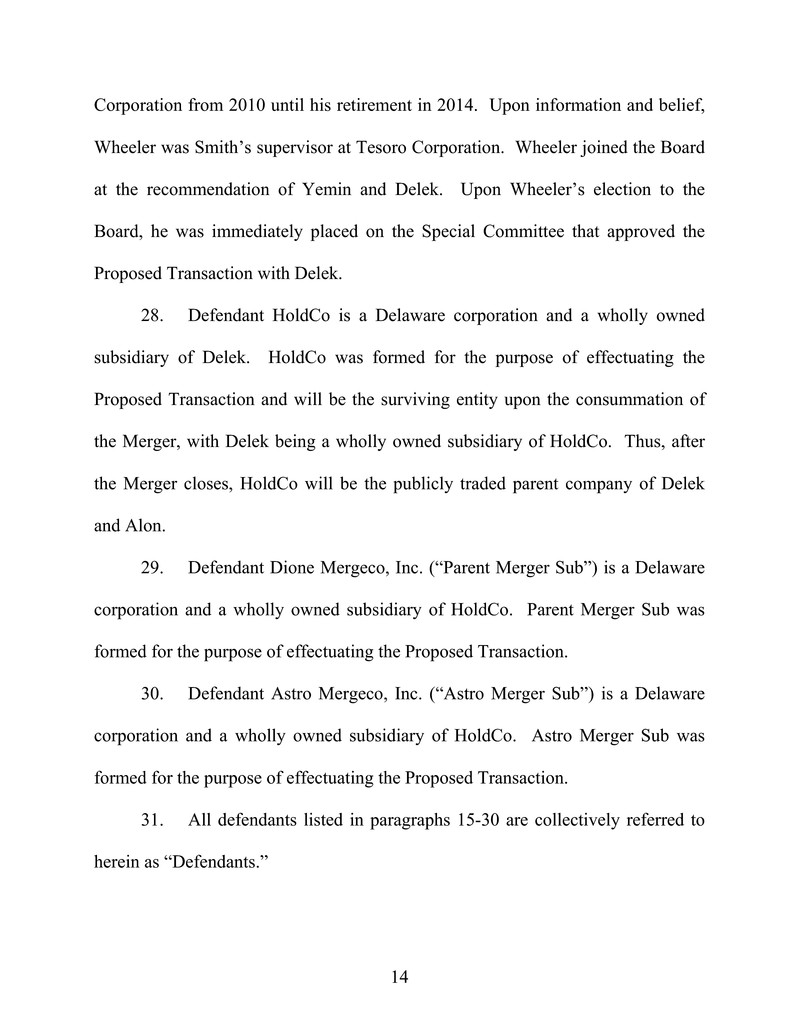
14 Corporation from 2010 until his retirement in 2014. Upon information and belief, Wheeler was Smith’s supervisor at Tesoro Corporation. Wheeler joined the Board at the recommendation of Yemin and Delek. Upon Wheeler’s election to the Board, he was immediately placed on the Special Committee that approved the Proposed Transaction with Delek. 28. Defendant HoldCo is a Delaware corporation and a wholly owned subsidiary of Delek. HoldCo was formed for the purpose of effectuating the Proposed Transaction and will be the surviving entity upon the consummation of the Merger, with Delek being a wholly owned subsidiary of HoldCo. Thus, after the Merger closes, HoldCo will be the publicly traded parent company of Delek and Alon. 29. Defendant Dione Mergeco, Inc. (“Parent Merger Sub”) is a Delaware corporation and a wholly owned subsidiary of HoldCo. Parent Merger Sub was formed for the purpose of effectuating the Proposed Transaction. 30. Defendant Astro Mergeco, Inc. (“Astro Merger Sub”) is a Delaware corporation and a wholly owned subsidiary of HoldCo. Astro Merger Sub was formed for the purpose of effectuating the Proposed Transaction. 31. All defendants listed in paragraphs 15-30 are collectively referred to herein as “Defendants.”

15 32. HoldCo, Parent Merger Sub and Astro Merger Sub are collectively referred to herein as the “Merger Sub Defendants.” 33. Yemin, Ginzburg, Green, Smith, Soreq, Wiessman, Cohen, Haddock, Kacal, Segal and Wheeler are collectively referred to herein as the “Director Defendants” or the “Individual Defendants.” SUBSTANTIVE ALLEGATIONS Background – Delek Acquires 48% of Alon, Signs Stockholder Agreements 34. Alon was incorporated in Delaware in 2000 and held its initial public offering (“IPO”) in 2005 when it was controlled by Alon Israel. After the IPO, Alon Israel maintained its majority ownership of the Company through January 2015. 35. In the spring of 2015, Alon Israel and its subsidiaries were experiencing substantial financial difficulties. Indeed, over the course of 2015 and into 2016, Alon Israel sold off not only its control position in Alon, but also Dor Alon, Blue Square and other assets. The business empire of Wiessman and his cronies was crumbling. Delek helped to rescue Wiessman and Alon Israel by buying the control position in Alon. 36. The Proxy (p. 81) claims that on February 2, 2015, Alon Israel asked Delek to purchase its then-55% interest in Alon. Delek was familiar with Alon because both companies had previously associated with Israeli oil and gas
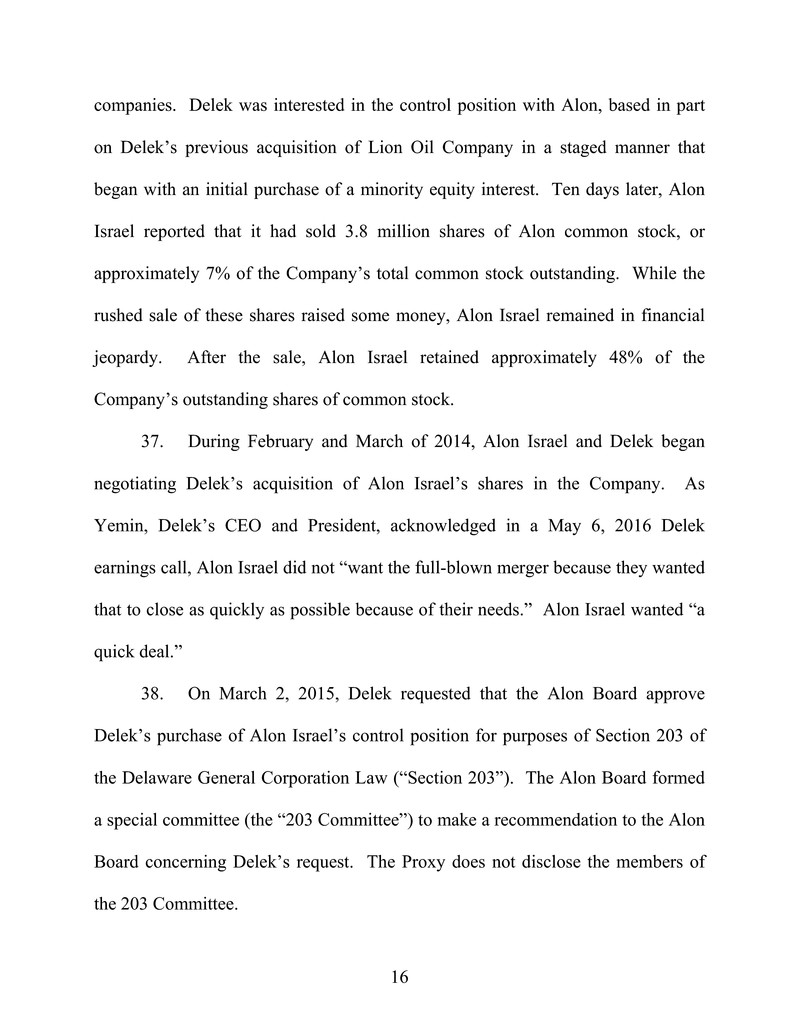
16 companies. Delek was interested in the control position with Alon, based in part on Delek’s previous acquisition of Lion Oil Company in a staged manner that began with an initial purchase of a minority equity interest. Ten days later, Alon Israel reported that it had sold 3.8 million shares of Alon common stock, or approximately 7% of the Company’s total common stock outstanding. While the rushed sale of these shares raised some money, Alon Israel remained in financial jeopardy. After the sale, Alon Israel retained approximately 48% of the Company’s outstanding shares of common stock. 37. During February and March of 2014, Alon Israel and Delek began negotiating Delek’s acquisition of Alon Israel’s shares in the Company. As Yemin, Delek’s CEO and President, acknowledged in a May 6, 2016 Delek earnings call, Alon Israel did not “want the full-blown merger because they wanted that to close as quickly as possible because of their needs.” Alon Israel wanted “a quick deal.” 38. On March 2, 2015, Delek requested that the Alon Board approve Delek’s purchase of Alon Israel’s control position for purposes of Section 203 of the Delaware General Corporation Law (“Section 203”). The Alon Board formed a special committee (the “203 Committee”) to make a recommendation to the Alon Board concerning Delek’s request. The Proxy does not disclose the members of the 203 Committee.

17 39. Between March 9, 2015 and March 19, 2015, the 203 Committee negotiated a stockholder agreement with Delek (the “Stockholder Agreement”). On April 14, 2015, Delek agreed to purchase approximately 33.7 million shares of Alon common stock from Alon Israel, accounting for approximately 48% of all Alon outstanding shares. The purchase price was valued at $572.4 million, or approximately $16.99 per share. The consideration consisted of $200 million in cash, six million shares of Delek and a $145 million unsecured promissory note. Alon Israel still owns the six million Delek shares, and is Delek’s largest stockholder. 40. During early April 2015, the 203 Committee and Delek negotiated an Amended and Restated Stockholder Agreement (the “Amended Stockholder Agreement”). The Proxy (p. 83) contains the following misleading partial disclosure concerning the Amended Stockholder Agreement: In addition, during early April 2015, Delek negotiated with the 203 Special Committee certain revisions and amendments to the Stockholder’s Agreement, including a “standstill” provision prohibiting Delek from acquiring additional shares that would result in Delek owning more than 49.99% of the outstanding Alon common stock before the 12-month anniversary of the closing of Delek’s purchase of the Alon shares from Alon Israel. The Amended and Restated Stockholder Agreement, entered into on April 14, 2015, also permitted Delek to nominate its own slate of directors, if it chose to do so, for Alon’s 2016 annual meeting of stockholders. (Emphasis added.)
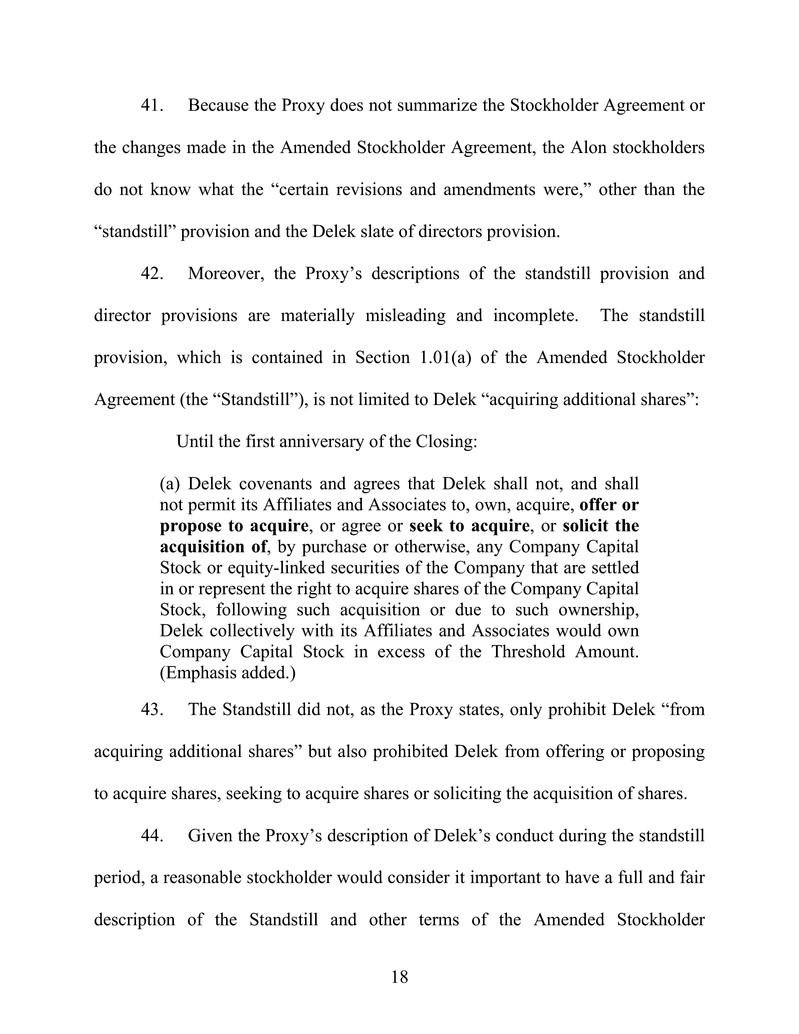
18 41. Because the Proxy does not summarize the Stockholder Agreement or the changes made in the Amended Stockholder Agreement, the Alon stockholders do not know what the “certain revisions and amendments were,” other than the “standstill” provision and the Delek slate of directors provision. 42. Moreover, the Proxy’s descriptions of the standstill provision and director provisions are materially misleading and incomplete. The standstill provision, which is contained in Section 1.01(a) of the Amended Stockholder Agreement (the “Standstill”), is not limited to Delek “acquiring additional shares”: Until the first anniversary of the Closing: (a) Delek covenants and agrees that Delek shall not, and shall not permit its Affiliates and Associates to, own, acquire, offer or propose to acquire, or agree or seek to acquire, or solicit the acquisition of, by purchase or otherwise, any Company Capital Stock or equity-linked securities of the Company that are settled in or represent the right to acquire shares of the Company Capital Stock, following such acquisition or due to such ownership, Delek collectively with its Affiliates and Associates would own Company Capital Stock in excess of the Threshold Amount. (Emphasis added.) 43. The Standstill did not, as the Proxy states, only prohibit Delek “from acquiring additional shares” but also prohibited Delek from offering or proposing to acquire shares, seeking to acquire shares or soliciting the acquisition of shares. 44. Given the Proxy’s description of Delek’s conduct during the standstill period, a reasonable stockholder would consider it important to have a full and fair description of the Standstill and other terms of the Amended Stockholder
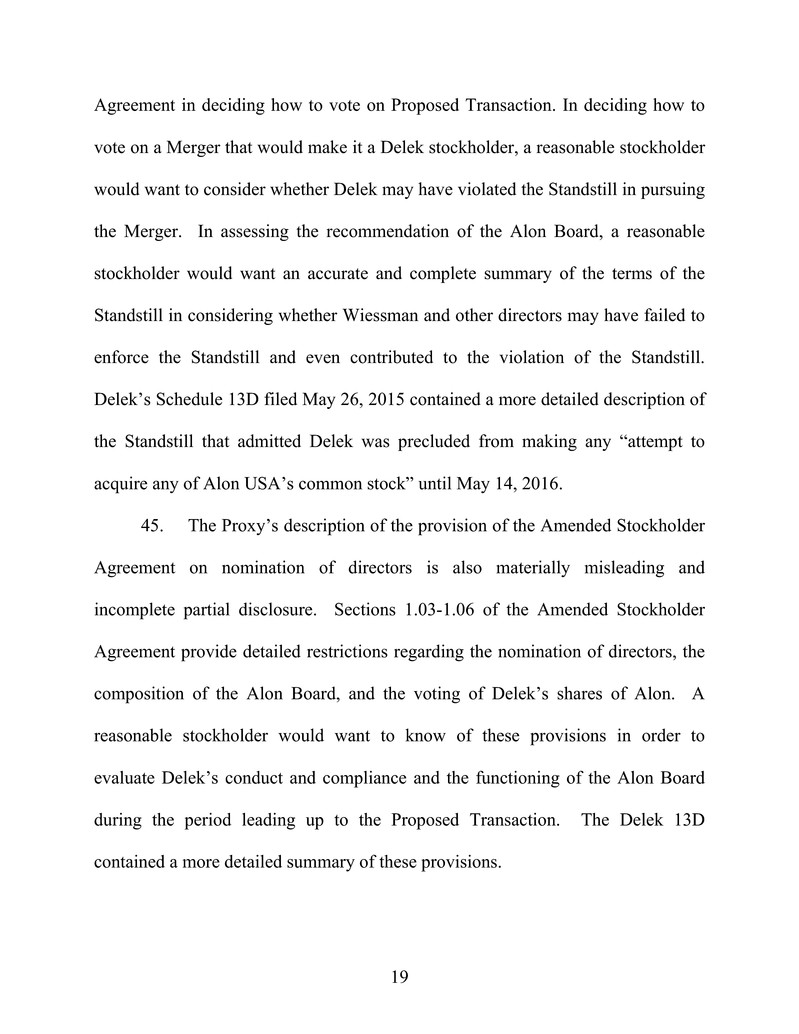
19 Agreement in deciding how to vote on Proposed Transaction. In deciding how to vote on a Merger that would make it a Delek stockholder, a reasonable stockholder would want to consider whether Delek may have violated the Standstill in pursuing the Merger. In assessing the recommendation of the Alon Board, a reasonable stockholder would want an accurate and complete summary of the terms of the Standstill in considering whether Wiessman and other directors may have failed to enforce the Standstill and even contributed to the violation of the Standstill. Delek’s Schedule 13D filed May 26, 2015 contained a more detailed description of the Standstill that admitted Delek was precluded from making any “attempt to acquire any of Alon USA’s common stock” until May 14, 2016. 45. The Proxy’s description of the provision of the Amended Stockholder Agreement on nomination of directors is also materially misleading and incomplete partial disclosure. Sections 1.03-1.06 of the Amended Stockholder Agreement provide detailed restrictions regarding the nomination of directors, the composition of the Alon Board, and the voting of Delek’s shares of Alon. A reasonable stockholder would want to know of these provisions in order to evaluate Delek’s conduct and compliance and the functioning of the Alon Board during the period leading up to the Proposed Transaction. The Delek 13D contained a more detailed summary of these provisions.
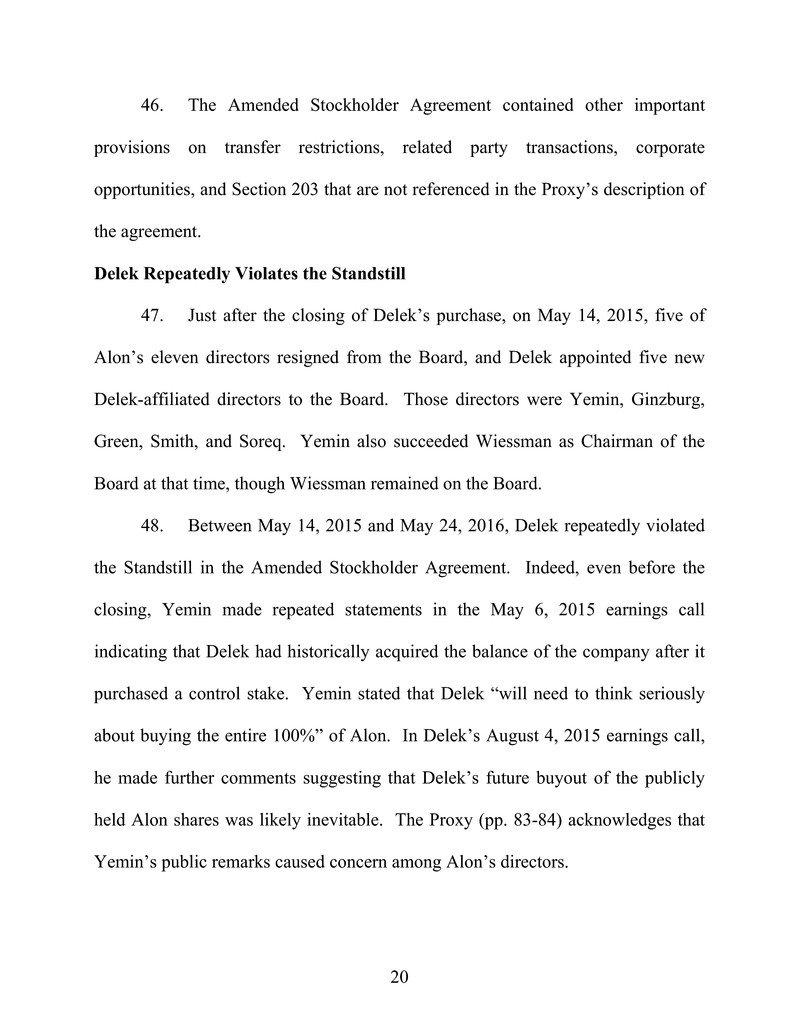
20 46. The Amended Stockholder Agreement contained other important provisions on transfer restrictions, related party transactions, corporate opportunities, and Section 203 that are not referenced in the Proxy’s description of the agreement. Delek Repeatedly Violates the Standstill 47. Just after the closing of Delek’s purchase, on May 14, 2015, five of Alon’s eleven directors resigned from the Board, and Delek appointed five new Delek-affiliated directors to the Board. Those directors were Yemin, Ginzburg, Green, Smith, and Soreq. Yemin also succeeded Wiessman as Chairman of the Board at that time, though Wiessman remained on the Board. 48. Between May 14, 2015 and May 24, 2016, Delek repeatedly violated the Standstill in the Amended Stockholder Agreement. Indeed, even before the closing, Yemin made repeated statements in the May 6, 2015 earnings call indicating that Delek had historically acquired the balance of the company after it purchased a control stake. Yemin stated that Delek “will need to think seriously about buying the entire 100%” of Alon. In Delek’s August 4, 2015 earnings call, he made further comments suggesting that Delek’s future buyout of the publicly held Alon shares was likely inevitable. The Proxy (pp. 83-84) acknowledges that Yemin’s public remarks caused concern among Alon’s directors.
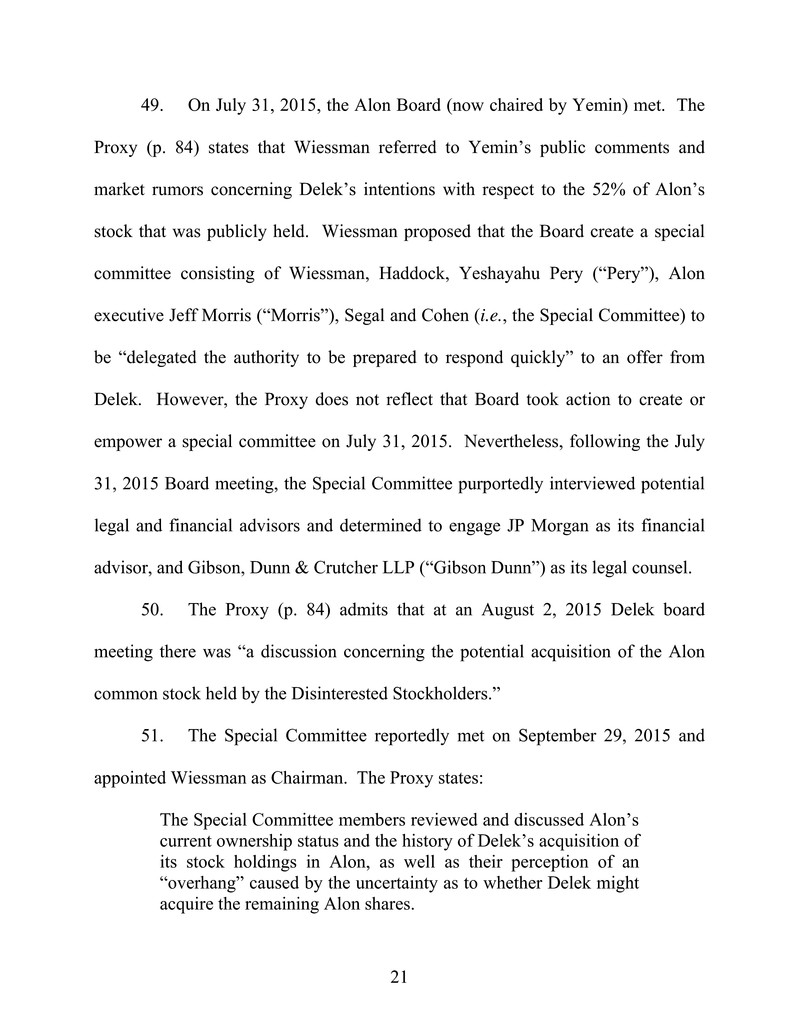
21 49. On July 31, 2015, the Alon Board (now chaired by Yemin) met. The Proxy (p. 84) states that Wiessman referred to Yemin’s public comments and market rumors concerning Delek’s intentions with respect to the 52% of Alon’s stock that was publicly held. Wiessman proposed that the Board create a special committee consisting of Wiessman, Haddock, Yeshayahu Pery (“Pery”), Alon executive Jeff Morris (“Morris”), Segal and Cohen (i.e., the Special Committee) to be “delegated the authority to be prepared to respond quickly” to an offer from Delek. However, the Proxy does not reflect that Board took action to create or empower a special committee on July 31, 2015. Nevertheless, following the July 31, 2015 Board meeting, the Special Committee purportedly interviewed potential legal and financial advisors and determined to engage JP Morgan as its financial advisor, and Gibson, Dunn & Crutcher LLP (“Gibson Dunn”) as its legal counsel. 50. The Proxy (p. 84) admits that at an August 2, 2015 Delek board meeting there was “a discussion concerning the potential acquisition of the Alon common stock held by the Disinterested Stockholders.” 51. The Special Committee reportedly met on September 29, 2015 and appointed Wiessman as Chairman. The Proxy states: The Special Committee members reviewed and discussed Alon’s current ownership status and the history of Delek’s acquisition of its stock holdings in Alon, as well as their perception of an “overhang” caused by the uncertainty as to whether Delek might acquire the remaining Alon shares.

22 52. On October 8, 2015, Wiessman supposedly inquired of Yemin “whether there was a transaction that Delek would contemplate in the near term of which the Special Committee should be aware.” The Proxy does not provide Yemin’s response. 53. On October 30, 2015, Yemin met with Wiessman and, according to the Proxy, Mr. Yemin told Mr. Wiessman that any deal between Delek and Alon would need to be a stock-for-stock deal due to leverage limitations but that, even the relative movement in the companies’ stock prices since Delek’s purchase of its 48% interest in Alon from Alon Israel, it might be difficult for Delek to propose an exchange ratio that would be attractive to the Disinterested Stockholders. By this point Delek was proposing to acquire, seeking to acquire and soliciting the acquisition of additional Alon stock. 54. The Proxy (p. 84) states that by October 30, 2015, questions had arisen “among Alon Board members regarding the establishment of the Special Committee.” The Proxy does not disclose what those questions were, but says because of the questions “the Alon Board formally approved” the formation of the Special Committee and its authority to engage financial and legal advisors. The Board also purportedly “agreed that further resolutions delineating the powers and duties of the Special Committee would subsequently be drafted and approved.”
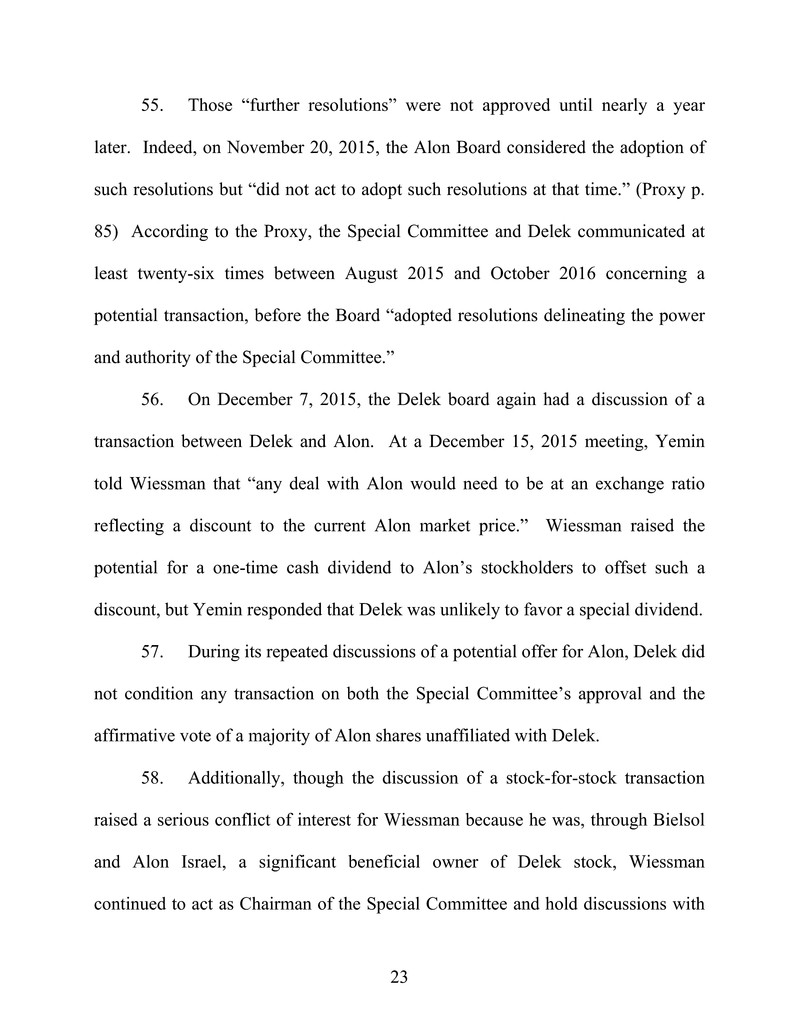
23 55. Those “further resolutions” were not approved until nearly a year later. Indeed, on November 20, 2015, the Alon Board considered the adoption of such resolutions but “did not act to adopt such resolutions at that time.” (Proxy p. 85) According to the Proxy, the Special Committee and Delek communicated at least twenty-six times between August 2015 and October 2016 concerning a potential transaction, before the Board “adopted resolutions delineating the power and authority of the Special Committee.” 56. On December 7, 2015, the Delek board again had a discussion of a transaction between Delek and Alon. At a December 15, 2015 meeting, Yemin told Wiessman that “any deal with Alon would need to be at an exchange ratio reflecting a discount to the current Alon market price.” Wiessman raised the potential for a one-time cash dividend to Alon’s stockholders to offset such a discount, but Yemin responded that Delek was unlikely to favor a special dividend. 57. During its repeated discussions of a potential offer for Alon, Delek did not condition any transaction on both the Special Committee’s approval and the affirmative vote of a majority of Alon shares unaffiliated with Delek. 58. Additionally, though the discussion of a stock-for-stock transaction raised a serious conflict of interest for Wiessman because he was, through Bielsol and Alon Israel, a significant beneficial owner of Delek stock, Wiessman continued to act as Chairman of the Special Committee and hold discussions with
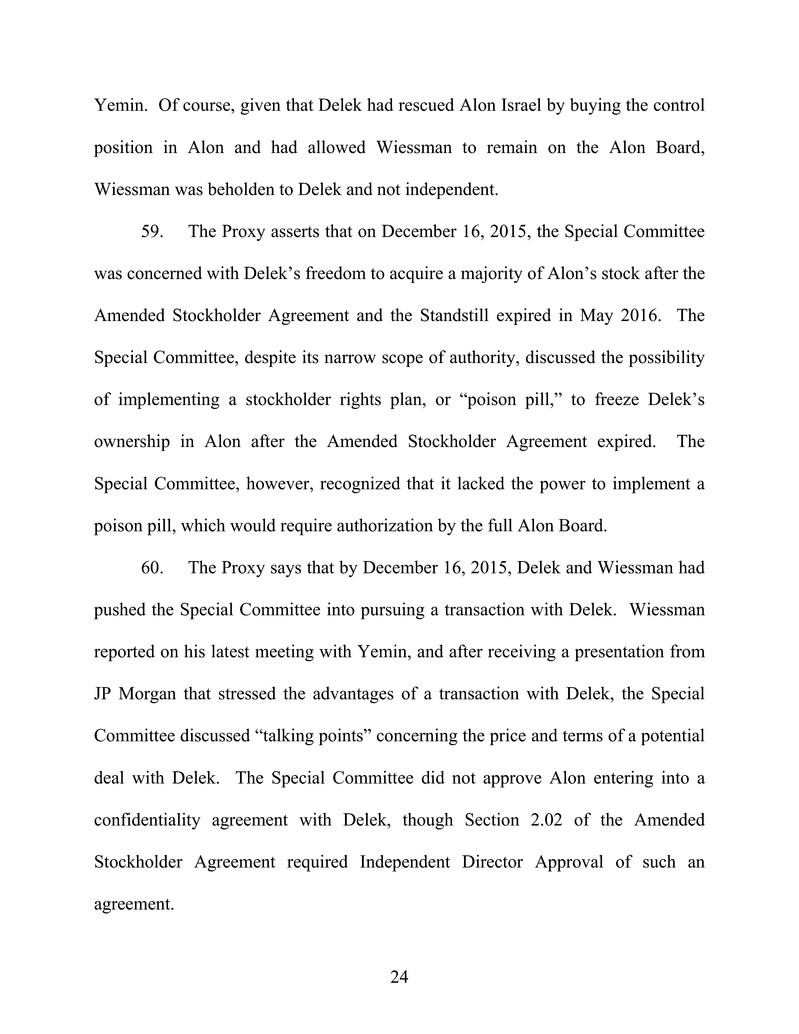
24 Yemin. Of course, given that Delek had rescued Alon Israel by buying the control position in Alon and had allowed Wiessman to remain on the Alon Board, Wiessman was beholden to Delek and not independent. 59. The Proxy asserts that on December 16, 2015, the Special Committee was concerned with Delek’s freedom to acquire a majority of Alon’s stock after the Amended Stockholder Agreement and the Standstill expired in May 2016. The Special Committee, despite its narrow scope of authority, discussed the possibility of implementing a stockholder rights plan, or “poison pill,” to freeze Delek’s ownership in Alon after the Amended Stockholder Agreement expired. The Special Committee, however, recognized that it lacked the power to implement a poison pill, which would require authorization by the full Alon Board. 60. The Proxy says that by December 16, 2015, Delek and Wiessman had pushed the Special Committee into pursuing a transaction with Delek. Wiessman reported on his latest meeting with Yemin, and after receiving a presentation from JP Morgan that stressed the advantages of a transaction with Delek, the Special Committee discussed “talking points” concerning the price and terms of a potential deal with Delek. The Special Committee did not approve Alon entering into a confidentiality agreement with Delek, though Section 2.02 of the Amended Stockholder Agreement required Independent Director Approval of such an agreement.
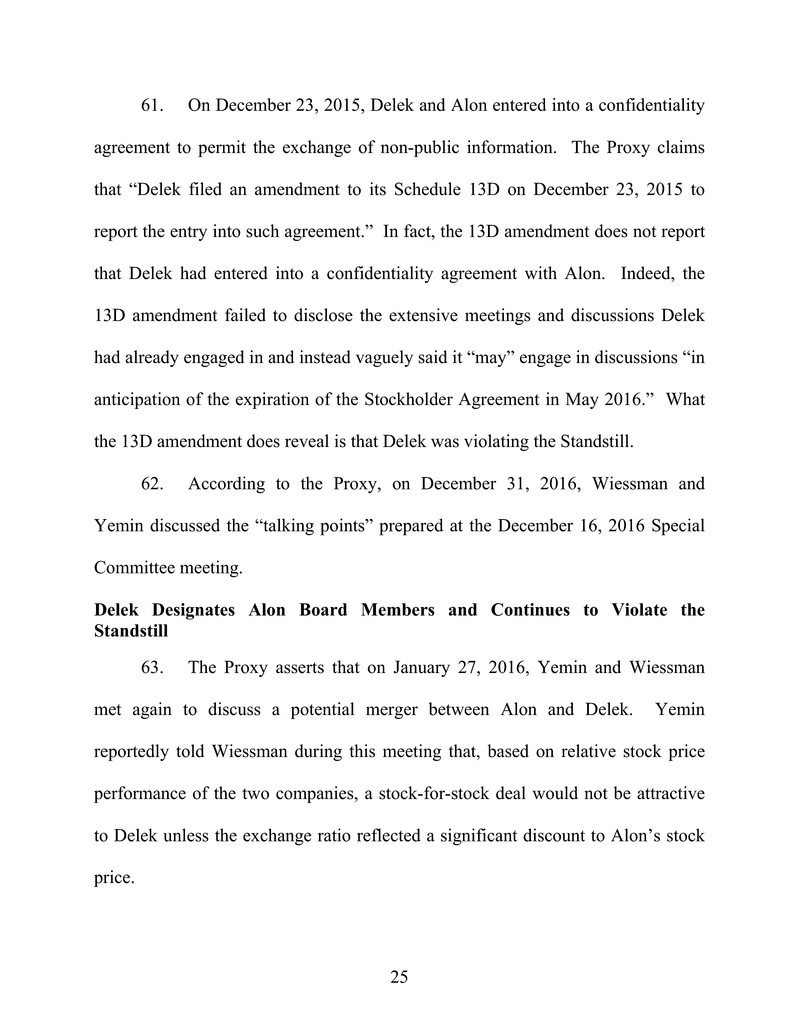
25 61. On December 23, 2015, Delek and Alon entered into a confidentiality agreement to permit the exchange of non-public information. The Proxy claims that “Delek filed an amendment to its Schedule 13D on December 23, 2015 to report the entry into such agreement.” In fact, the 13D amendment does not report that Delek had entered into a confidentiality agreement with Alon. Indeed, the 13D amendment failed to disclose the extensive meetings and discussions Delek had already engaged in and instead vaguely said it “may” engage in discussions “in anticipation of the expiration of the Stockholder Agreement in May 2016.” What the 13D amendment does reveal is that Delek was violating the Standstill. 62. According to the Proxy, on December 31, 2016, Wiessman and Yemin discussed the “talking points” prepared at the December 16, 2016 Special Committee meeting. Delek Designates Alon Board Members and Continues to Violate the Standstill 63. The Proxy asserts that on January 27, 2016, Yemin and Wiessman met again to discuss a potential merger between Alon and Delek. Yemin reportedly told Wiessman during this meeting that, based on relative stock price performance of the two companies, a stock-for-stock deal would not be attractive to Delek unless the exchange ratio reflected a significant discount to Alon’s stock price.
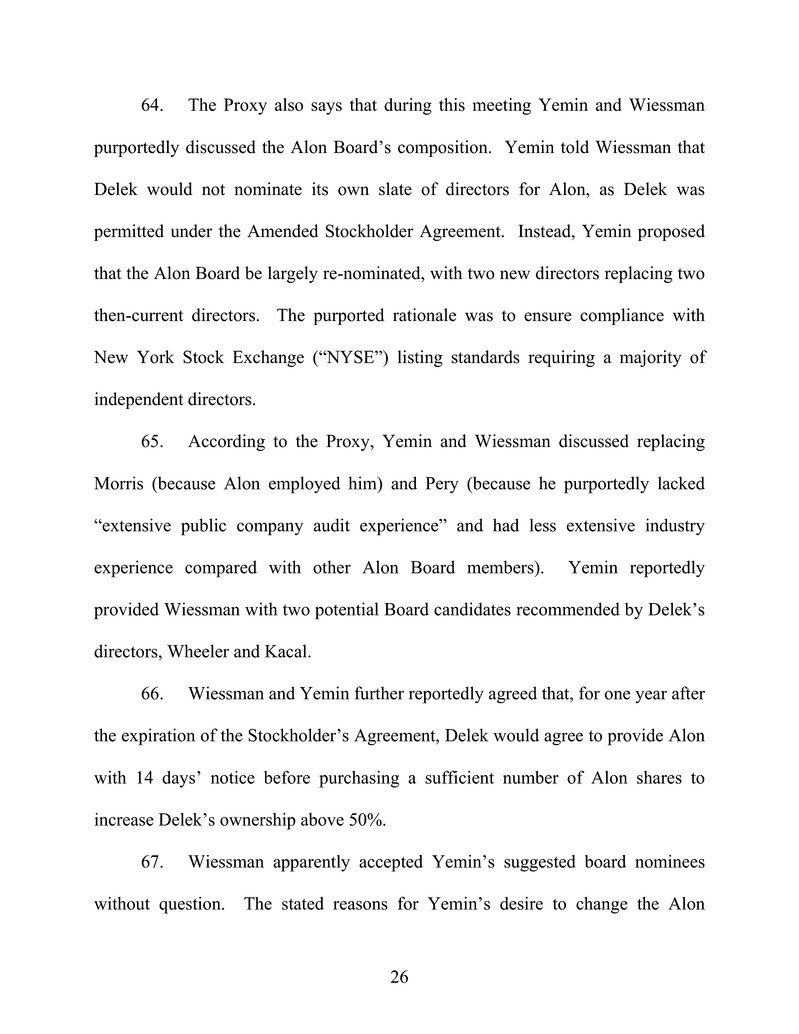
26 64. The Proxy also says that during this meeting Yemin and Wiessman purportedly discussed the Alon Board’s composition. Yemin told Wiessman that Delek would not nominate its own slate of directors for Alon, as Delek was permitted under the Amended Stockholder Agreement. Instead, Yemin proposed that the Alon Board be largely re-nominated, with two new directors replacing two then-current directors. The purported rationale was to ensure compliance with New York Stock Exchange (“NYSE”) listing standards requiring a majority of independent directors. 65. According to the Proxy, Yemin and Wiessman discussed replacing Morris (because Alon employed him) and Pery (because he purportedly lacked “extensive public company audit experience” and had less extensive industry experience compared with other Alon Board members). Yemin reportedly provided Wiessman with two potential Board candidates recommended by Delek’s directors, Wheeler and Kacal. 66. Wiessman and Yemin further reportedly agreed that, for one year after the expiration of the Stockholder’s Agreement, Delek would agree to provide Alon with 14 days’ notice before purchasing a sufficient number of Alon shares to increase Delek’s ownership above 50%. 67. Wiessman apparently accepted Yemin’s suggested board nominees without question. The stated reasons for Yemin’s desire to change the Alon

27 Board’s composition are, however, suspect. First, the Board had previously determined that Pery was “independent” under NYSE listing standards. Second, the Company’s proxy statement for its annual meeting later in 2016 states that ten of the eleven nominated director candidates – i.e., everyone but former Alon officer Wiessman – was “independent” under the NYSE rules. Accordingly, based on the Company’s disclosures, there was no need to replace Morris and Pery in order to ensure a majority of “independent” directors and compliance with NYSE listing standards. Upon information and belief, the only reason Wiessman and the rest of the Alon Board approved Wheeler and Kacal to replace Morris and Pery was that Delek demanded the change in the Board’s composition. 68. Upon Wheeler’s and Kacal’s election to the Board at the annual meeting on May 3, 2016, they were both named to the Special Committee. Accordingly, Delek effectively named two Special Committee members. 69. Despite no reported intervening Board or Special Committee meeting since Yemin and Wiessman met on January 27, the Proxy states that on January 29, 2016, Alon – purportedly with Board-passed resolutions and Board approval – agreed to further amend the Amended Stockholder Agreement with Delek “to provide for the nomination of the directors discussed by Mr. Yemin and Mr. Wiessman” (the “Second Amended Stockholder Agreement”). Specifically, the Second Amended Stockholder Agreement permitted Delek to designate five of its
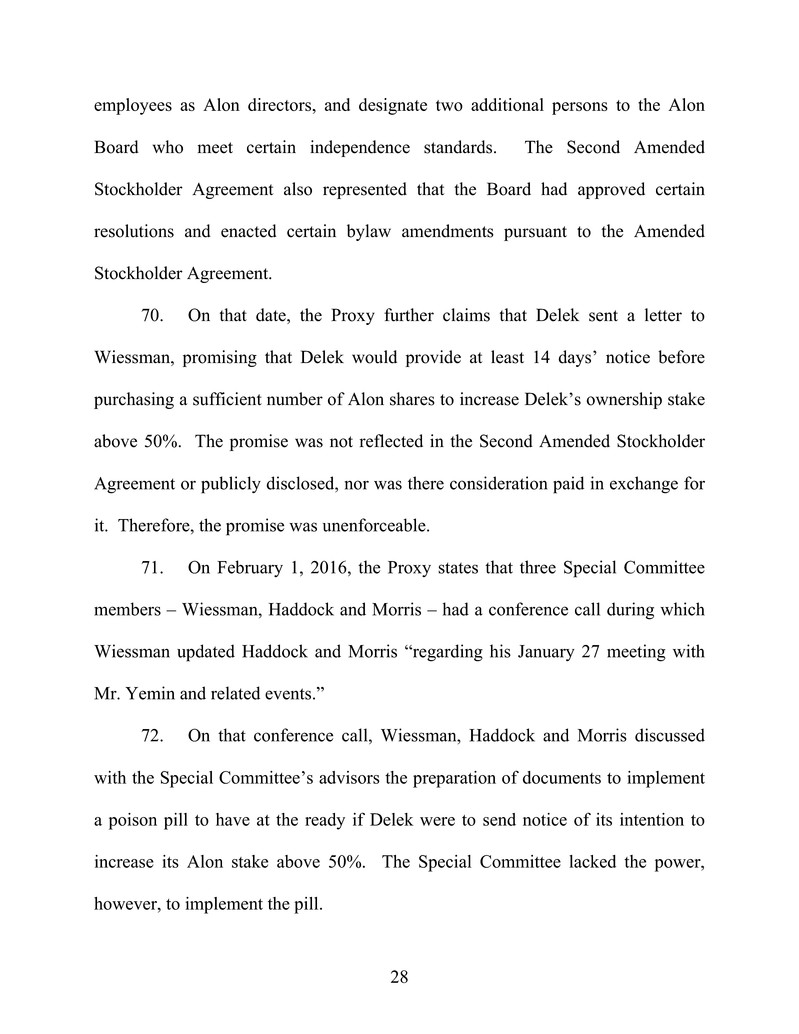
28 employees as Alon directors, and designate two additional persons to the Alon Board who meet certain independence standards. The Second Amended Stockholder Agreement also represented that the Board had approved certain resolutions and enacted certain bylaw amendments pursuant to the Amended Stockholder Agreement. 70. On that date, the Proxy further claims that Delek sent a letter to Wiessman, promising that Delek would provide at least 14 days’ notice before purchasing a sufficient number of Alon shares to increase Delek’s ownership stake above 50%. The promise was not reflected in the Second Amended Stockholder Agreement or publicly disclosed, nor was there consideration paid in exchange for it. Therefore, the promise was unenforceable. 71. On February 1, 2016, the Proxy states that three Special Committee members – Wiessman, Haddock and Morris – had a conference call during which Wiessman updated Haddock and Morris “regarding his January 27 meeting with Mr. Yemin and related events.” 72. On that conference call, Wiessman, Haddock and Morris discussed with the Special Committee’s advisors the preparation of documents to implement a poison pill to have at the ready if Delek were to send notice of its intention to increase its Alon stake above 50%. The Special Committee lacked the power, however, to implement the pill.
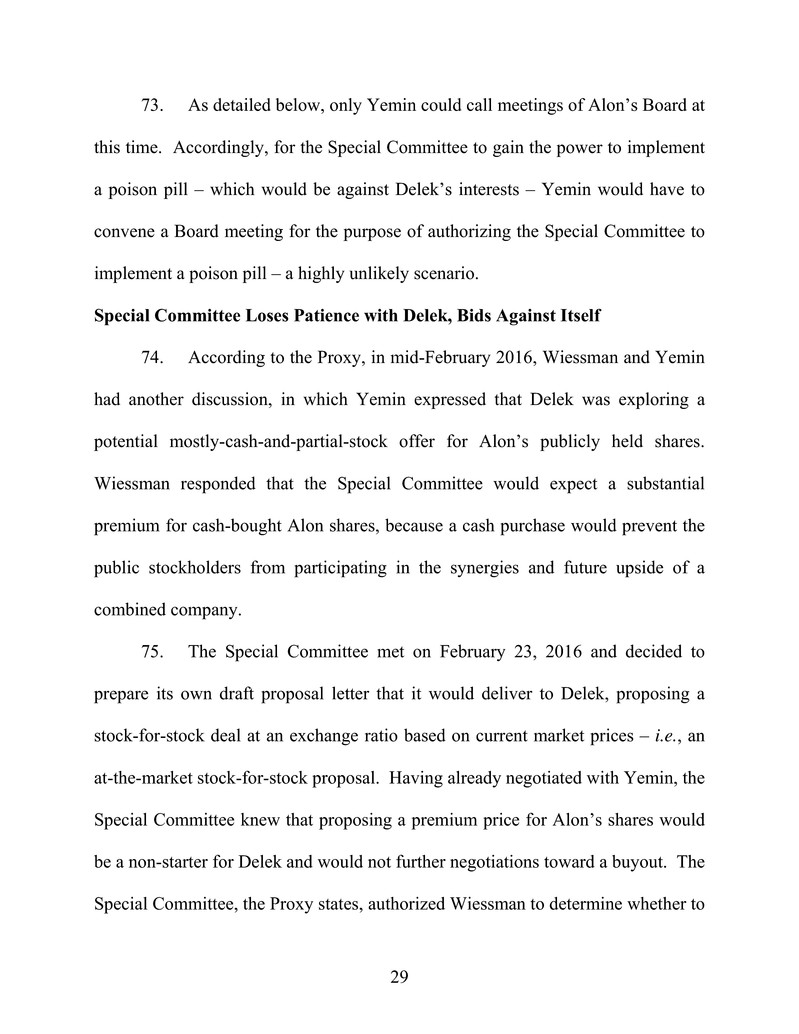
29 73. As detailed below, only Yemin could call meetings of Alon’s Board at this time. Accordingly, for the Special Committee to gain the power to implement a poison pill – which would be against Delek’s interests – Yemin would have to convene a Board meeting for the purpose of authorizing the Special Committee to implement a poison pill – a highly unlikely scenario. Special Committee Loses Patience with Delek, Bids Against Itself 74. According to the Proxy, in mid-February 2016, Wiessman and Yemin had another discussion, in which Yemin expressed that Delek was exploring a potential mostly-cash-and-partial-stock offer for Alon’s publicly held shares. Wiessman responded that the Special Committee would expect a substantial premium for cash-bought Alon shares, because a cash purchase would prevent the public stockholders from participating in the synergies and future upside of a combined company. 75. The Special Committee met on February 23, 2016 and decided to prepare its own draft proposal letter that it would deliver to Delek, proposing a stock-for-stock deal at an exchange ratio based on current market prices – i.e., an at-the-market stock-for-stock proposal. Having already negotiated with Yemin, the Special Committee knew that proposing a premium price for Alon’s shares would be a non-starter for Delek and would not further negotiations toward a buyout. The Special Committee, the Proxy states, authorized Wiessman to determine whether to
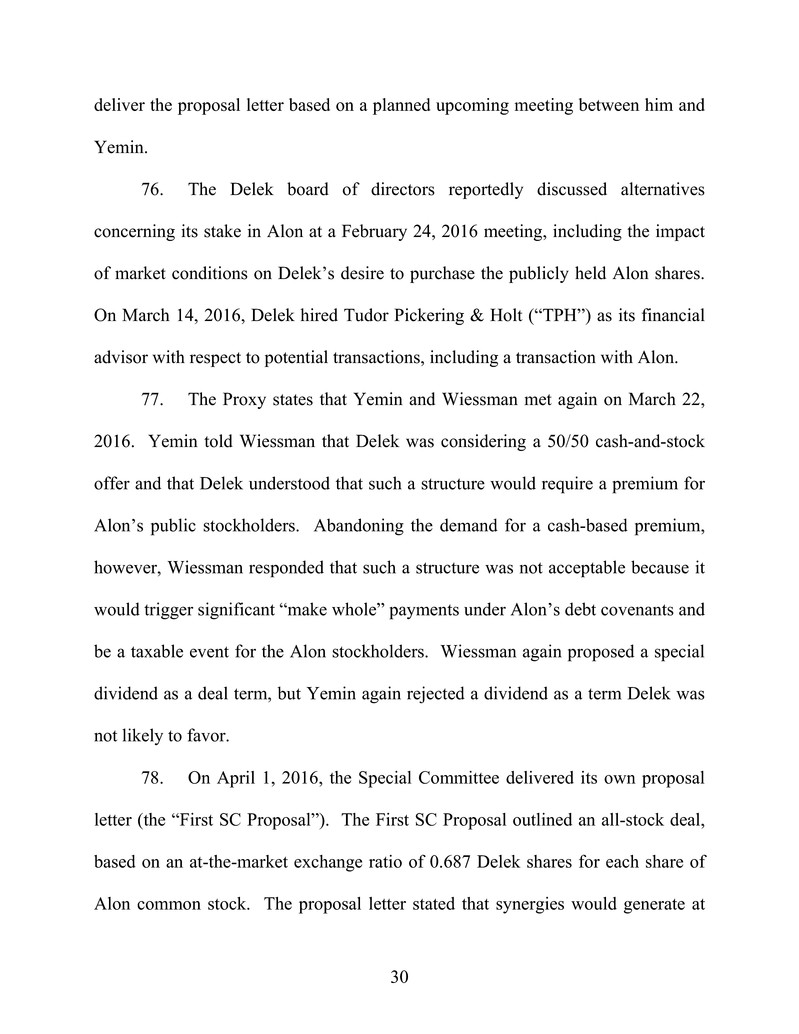
30 deliver the proposal letter based on a planned upcoming meeting between him and Yemin. 76. The Delek board of directors reportedly discussed alternatives concerning its stake in Alon at a February 24, 2016 meeting, including the impact of market conditions on Delek’s desire to purchase the publicly held Alon shares. On March 14, 2016, Delek hired Tudor Pickering & Holt (“TPH”) as its financial advisor with respect to potential transactions, including a transaction with Alon. 77. The Proxy states that Yemin and Wiessman met again on March 22, 2016. Yemin told Wiessman that Delek was considering a 50/50 cash-and-stock offer and that Delek understood that such a structure would require a premium for Alon’s public stockholders. Abandoning the demand for a cash-based premium, however, Wiessman responded that such a structure was not acceptable because it would trigger significant “make whole” payments under Alon’s debt covenants and be a taxable event for the Alon stockholders. Wiessman again proposed a special dividend as a deal term, but Yemin again rejected a dividend as a term Delek was not likely to favor. 78. On April 1, 2016, the Special Committee delivered its own proposal letter (the “First SC Proposal”). The First SC Proposal outlined an all-stock deal, based on an at-the-market exchange ratio of 0.687 Delek shares for each share of Alon common stock. The proposal letter stated that synergies would generate at
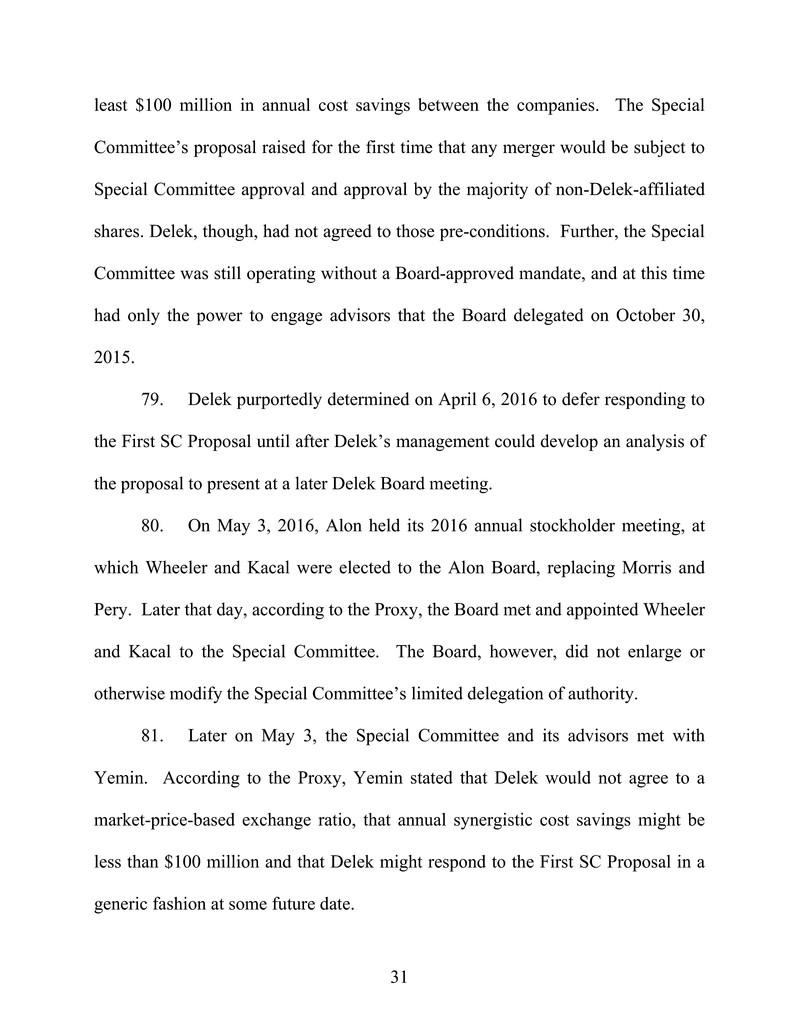
31 least $100 million in annual cost savings between the companies. The Special Committee’s proposal raised for the first time that any merger would be subject to Special Committee approval and approval by the majority of non-Delek-affiliated shares. Delek, though, had not agreed to those pre-conditions. Further, the Special Committee was still operating without a Board-approved mandate, and at this time had only the power to engage advisors that the Board delegated on October 30, 2015. 79. Delek purportedly determined on April 6, 2016 to defer responding to the First SC Proposal until after Delek’s management could develop an analysis of the proposal to present at a later Delek Board meeting. 80. On May 3, 2016, Alon held its 2016 annual stockholder meeting, at which Wheeler and Kacal were elected to the Alon Board, replacing Morris and Pery. Later that day, according to the Proxy, the Board met and appointed Wheeler and Kacal to the Special Committee. The Board, however, did not enlarge or otherwise modify the Special Committee’s limited delegation of authority. 81. Later on May 3, the Special Committee and its advisors met with Yemin. According to the Proxy, Yemin stated that Delek would not agree to a market-price-based exchange ratio, that annual synergistic cost savings might be less than $100 million and that Delek might respond to the First SC Proposal in a generic fashion at some future date.

32 82. On May 6, 2016, Delek conducted its first-quarter earnings conference call with investors. Responding to questions, Yemin essentially revealed the status of his discussions with Wiessman. Specifically, as set forth in the Proxy, Yemin stated that Delek “believed with some certainty that a deal could be done with Alon at no premium to the current ratio, but that Delek did not want to do a deal at that ratio.” Yemin further stated his belief that “the independent directors of Alon understood that ‘it doesn’t make sense’ for there to be a transaction at an exchange ratio based on current market prices.” Thus, Yemin decided to tell Delek’s investors about price terms that Delek would reject and purported to express a view of the Special Committee’s mindset on price that could only have been informed by his negotiations with Wiessman and the Special Committee. In other words, Yemin exploited Delek’s controlling stake in Alon to influence his deal negotiations with Wiessman and the Special Committee. 83. Alon’s common stock closed down 7% the day following Yemin’s comments. In a May 13, 2016 discussion, Yemin reportedly told Wiessman that Delek favored a deal with an exchange ratio that would represent a discount to Alon’s stock price. Wiessman repeated that such a discount would be unacceptable to the Special Committee. 84. On May 18, 2016, Delek formally responded to the First SC Proposal, stating that “Delek continues to monitor market and company conditions,” and that

33 Wiessman would be contacted “once we believe conditions are more supportive of a discussion regarding this matter.” Delek gave the impression that it was working to create more liquidity through one or more other transactions it was considering. 85. After learning of Yemin’s statements on the May 6 Delek earnings call, Wiessman emailed Yemin on May 22, 2016, stating that Yemin’s: recent public comments regarding our discussions and your views on a potential transaction are not conducive to us finding a way toward a transaction that creates value for all of the shareholders. In our view your comments have caused undue volatility in the stocks and because of those public comments the committee advisors are telling us that we should publicly communicate directly with our shareholders as well. With all of this, I would ask that you be much more cautious in your public statements in the future. (Emphasis added). In his email, Wiessman also stated that, owing to the lack of clarity around a potential deal, Alon management had stopped sharing synergy information with Delek’s deal team. “I’m not sure exactly where things will go from here but I’m sure [the Special Committee will] have some form of a formal response to your letter.” 86. That response was in the form of a letter to Delek on May 25, 2016, in which the Special Committee signaled its weak negotiating position by bidding against itself and proposing a 0.615x exchange ratio (the “Second SC Proposal”). While the Second SC Proposal, like the First SC Proposal, offered an “at-the- market” exchange ratio, the ratio in the Second SC Proposal was lower than the
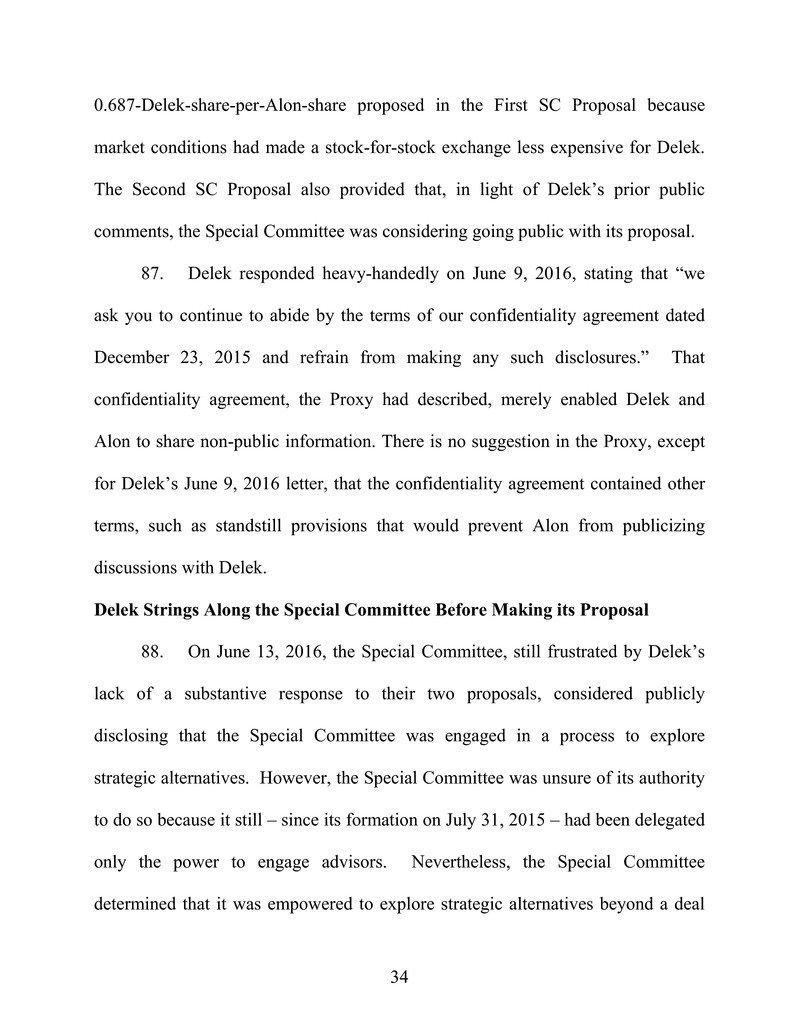
34 0.687-Delek-share-per-Alon-share proposed in the First SC Proposal because market conditions had made a stock-for-stock exchange less expensive for Delek. The Second SC Proposal also provided that, in light of Delek’s prior public comments, the Special Committee was considering going public with its proposal. 87. Delek responded heavy-handedly on June 9, 2016, stating that “we ask you to continue to abide by the terms of our confidentiality agreement dated December 23, 2015 and refrain from making any such disclosures.” That confidentiality agreement, the Proxy had described, merely enabled Delek and Alon to share non-public information. There is no suggestion in the Proxy, except for Delek’s June 9, 2016 letter, that the confidentiality agreement contained other terms, such as standstill provisions that would prevent Alon from publicizing discussions with Delek. Delek Strings Along the Special Committee Before Making its Proposal 88. On June 13, 2016, the Special Committee, still frustrated by Delek’s lack of a substantive response to their two proposals, considered publicly disclosing that the Special Committee was engaged in a process to explore strategic alternatives. However, the Special Committee was unsure of its authority to do so because it still – since its formation on July 31, 2015 – had been delegated only the power to engage advisors. Nevertheless, the Special Committee determined that it was empowered to explore strategic alternatives beyond a deal

35 with Delek, and asked JP Morgan and Gibson Dunn to work on talking points for Wiessman to communicate to Yemin. The Special Committee also discussed preparing a press release, and gave Wiessman authority to issue it if he thought appropriate after a discussion with Yemin. 89. Delek, however, pushed back on the Special Committee’s determination of its scope of authority. The next day, June 14, 2016, Wiessman and Yemin discussed the extent of the Special Committee’s authority, and Yemin stated his understanding that the Special Committee only had the authority to explore a transaction with Delek, and had no authority to review potential alternative transactions with any other party. 90. Wiessman followed up on June 20, 2016 with the talking points prepared by the Special Committee’s advisors, and specifically noted that the time that had elapsed since the First SC Proposal and the Second SC Proposal should have been used to make progress in deal negotiations, and not “as an opportunity for the exchange ratio to move in Delek US’s favor as the result of other strategic actions Delek US may pursue.” 91. Delek responded on June 24, through Yemin, that “liquidity considerations and the interests of Delek’s shareholders remain our priority and the basis from which we will assess any next steps and the timing of them.”
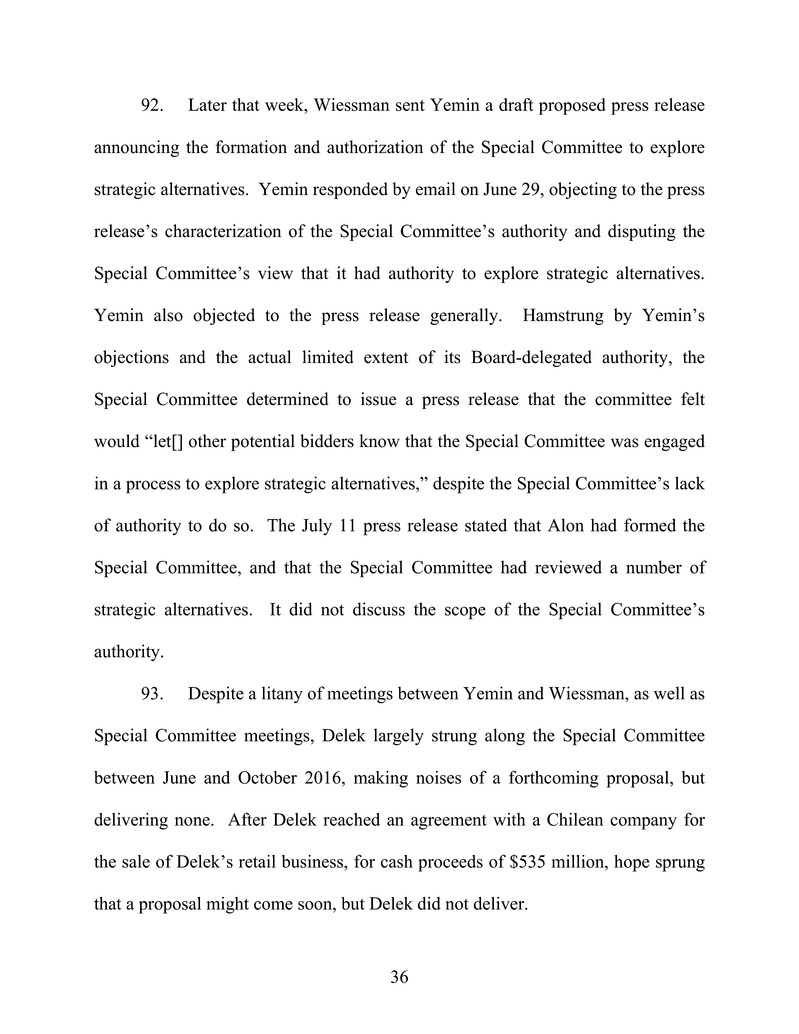
36 92. Later that week, Wiessman sent Yemin a draft proposed press release announcing the formation and authorization of the Special Committee to explore strategic alternatives. Yemin responded by email on June 29, objecting to the press release’s characterization of the Special Committee’s authority and disputing the Special Committee’s view that it had authority to explore strategic alternatives. Yemin also objected to the press release generally. Hamstrung by Yemin’s objections and the actual limited extent of its Board-delegated authority, the Special Committee determined to issue a press release that the committee felt would “let[] other potential bidders know that the Special Committee was engaged in a process to explore strategic alternatives,” despite the Special Committee’s lack of authority to do so. The July 11 press release stated that Alon had formed the Special Committee, and that the Special Committee had reviewed a number of strategic alternatives. It did not discuss the scope of the Special Committee’s authority. 93. Despite a litany of meetings between Yemin and Wiessman, as well as Special Committee meetings, Delek largely strung along the Special Committee between June and October 2016, making noises of a forthcoming proposal, but delivering none. After Delek reached an agreement with a Chilean company for the sale of Delek’s retail business, for cash proceeds of $535 million, hope sprung that a proposal might come soon, but Delek did not deliver.

37 94. The impatient Special Committee, thus, determined to deliver another proposal to Delek on October 13, 2016 (the “Third SC Proposal”). Again negotiating against itself, the Special Committee this time proposed an all-stock transaction at an exchange ratio of 0.527 to 0.563 Delek shares for each share of Alon common stock, “subject to a customary control premium.” Delek had yet to counter with an offer of its own since the First SC Proposal, and yet Delek’s inaction had resulted in the Special Committee’s reducing its price terms from a 0.687x exchange ratio to a ratio as low as 0.527x, a reduction of more than 30%. While the Special Committee also threatened in the Third SC Proposal that it would seek to market Delek’s 48% stake in Alon if Delek did not make a proposal soon, that threat had already been rendered empty by Yemin’s repeated statements to Wiessman that Delek was not interested in selling its Alon stake. 95. This deterioration of the Special Committee’s bargaining position is a foreseeable result of a controlling stockholder that does not disable itself at the outset, before negotiations begin, by conditioning any deal with the controlled company on (i) the affirmative recommendation of a broadly empowered special committee that has the power to say no to a controller and (ii) the affirmative vote of a majority of the shares not owned by the controller. Without those guarantees, the Special Committee could not replicate anything resembling arm’s-length negotiations on a level playing field.
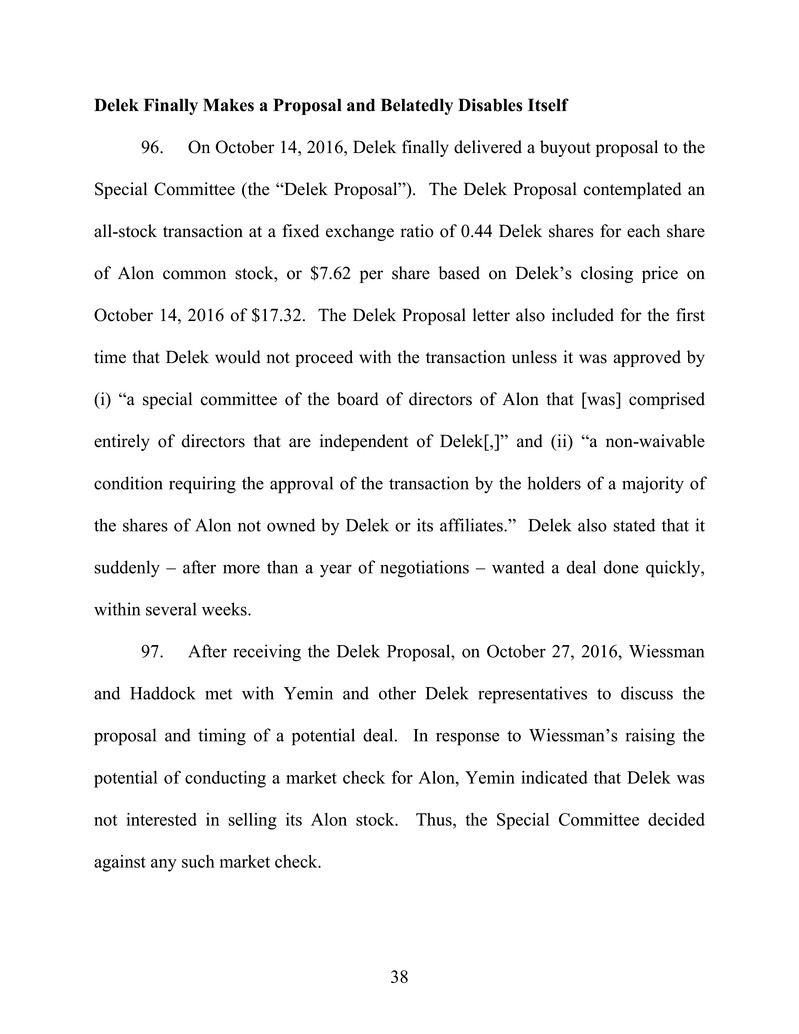
38 Delek Finally Makes a Proposal and Belatedly Disables Itself 96. On October 14, 2016, Delek finally delivered a buyout proposal to the Special Committee (the “Delek Proposal”). The Delek Proposal contemplated an all-stock transaction at a fixed exchange ratio of 0.44 Delek shares for each share of Alon common stock, or $7.62 per share based on Delek’s closing price on October 14, 2016 of $17.32. The Delek Proposal letter also included for the first time that Delek would not proceed with the transaction unless it was approved by (i) “a special committee of the board of directors of Alon that [was] comprised entirely of directors that are independent of Delek[,]” and (ii) “a non-waivable condition requiring the approval of the transaction by the holders of a majority of the shares of Alon not owned by Delek or its affiliates.” Delek also stated that it suddenly – after more than a year of negotiations – wanted a deal done quickly, within several weeks. 97. After receiving the Delek Proposal, on October 27, 2016, Wiessman and Haddock met with Yemin and other Delek representatives to discuss the proposal and timing of a potential deal. In response to Wiessman’s raising the potential of conducting a market check for Alon, Yemin indicated that Delek was not interested in selling its Alon stock. Thus, the Special Committee decided against any such market check.
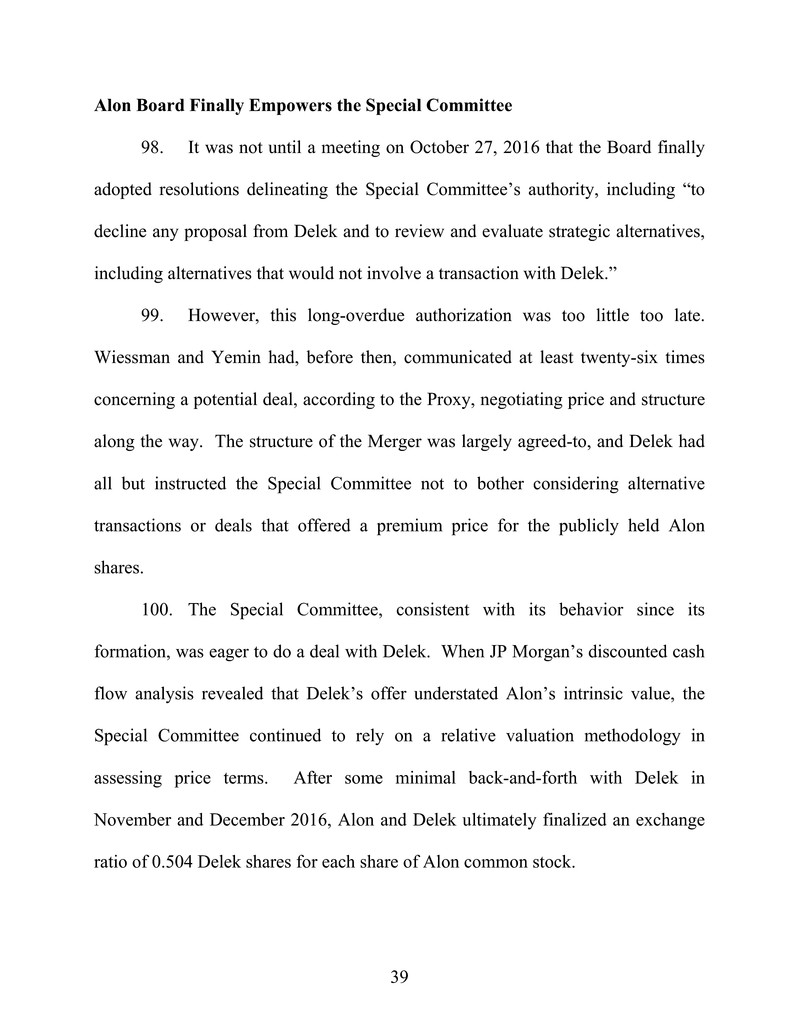
39 Alon Board Finally Empowers the Special Committee 98. It was not until a meeting on October 27, 2016 that the Board finally adopted resolutions delineating the Special Committee’s authority, including “to decline any proposal from Delek and to review and evaluate strategic alternatives, including alternatives that would not involve a transaction with Delek.” 99. However, this long-overdue authorization was too little too late. Wiessman and Yemin had, before then, communicated at least twenty-six times concerning a potential deal, according to the Proxy, negotiating price and structure along the way. The structure of the Merger was largely agreed-to, and Delek had all but instructed the Special Committee not to bother considering alternative transactions or deals that offered a premium price for the publicly held Alon shares. 100. The Special Committee, consistent with its behavior since its formation, was eager to do a deal with Delek. When JP Morgan’s discounted cash flow analysis revealed that Delek’s offer understated Alon’s intrinsic value, the Special Committee continued to rely on a relative valuation methodology in assessing price terms. After some minimal back-and-forth with Delek in November and December 2016, Alon and Delek ultimately finalized an exchange ratio of 0.504 Delek shares for each share of Alon common stock.
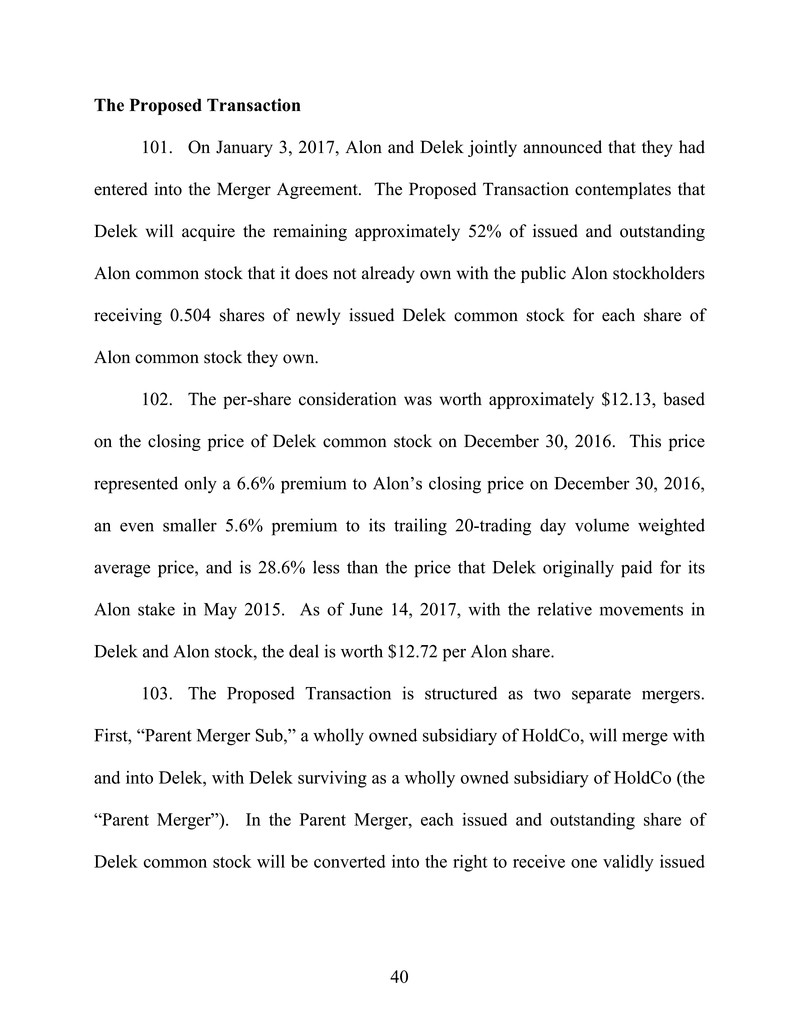
40 The Proposed Transaction 101. On January 3, 2017, Alon and Delek jointly announced that they had entered into the Merger Agreement. The Proposed Transaction contemplates that Delek will acquire the remaining approximately 52% of issued and outstanding Alon common stock that it does not already own with the public Alon stockholders receiving 0.504 shares of newly issued Delek common stock for each share of Alon common stock they own. 102. The per-share consideration was worth approximately $12.13, based on the closing price of Delek common stock on December 30, 2016. This price represented only a 6.6% premium to Alon’s closing price on December 30, 2016, an even smaller 5.6% premium to its trailing 20-trading day volume weighted average price, and is 28.6% less than the price that Delek originally paid for its Alon stake in May 2015. As of June 14, 2017, with the relative movements in Delek and Alon stock, the deal is worth $12.72 per Alon share. 103. The Proposed Transaction is structured as two separate mergers. First, “Parent Merger Sub,” a wholly owned subsidiary of HoldCo, will merge with and into Delek, with Delek surviving as a wholly owned subsidiary of HoldCo (the “Parent Merger”). In the Parent Merger, each issued and outstanding share of Delek common stock will be converted into the right to receive one validly issued
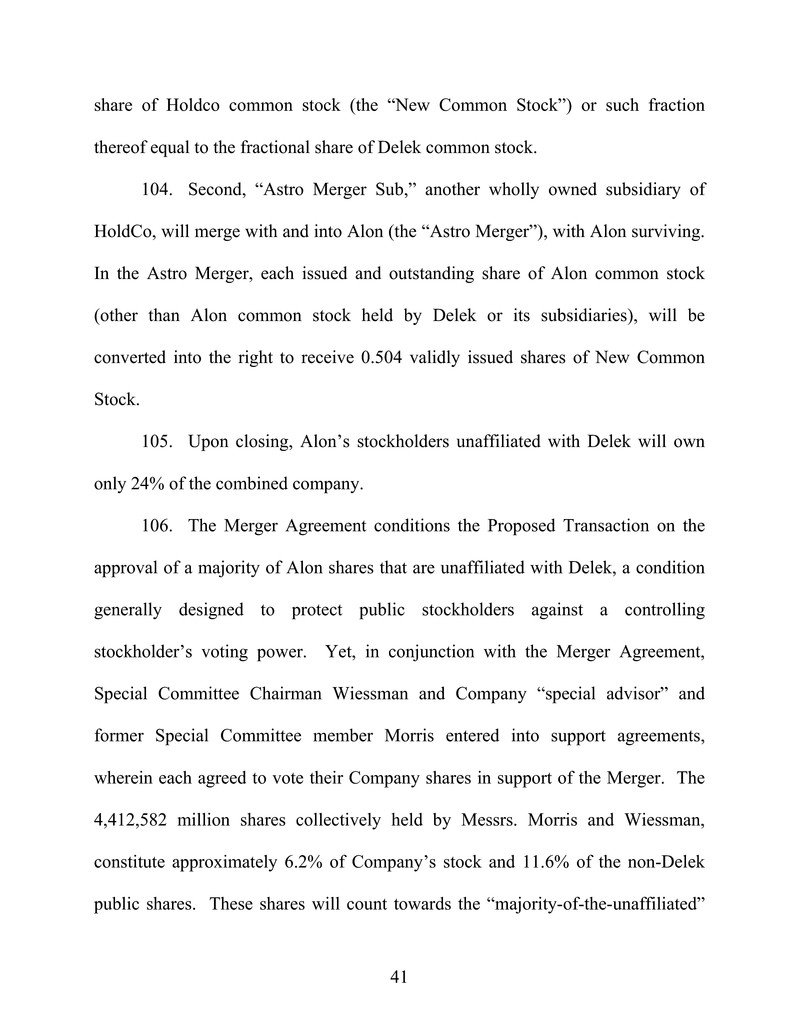
41 share of Holdco common stock (the “New Common Stock”) or such fraction thereof equal to the fractional share of Delek common stock. 104. Second, “Astro Merger Sub,” another wholly owned subsidiary of HoldCo, will merge with and into Alon (the “Astro Merger”), with Alon surviving. In the Astro Merger, each issued and outstanding share of Alon common stock (other than Alon common stock held by Delek or its subsidiaries), will be converted into the right to receive 0.504 validly issued shares of New Common Stock. 105. Upon closing, Alon’s stockholders unaffiliated with Delek will own only 24% of the combined company. 106. The Merger Agreement conditions the Proposed Transaction on the approval of a majority of Alon shares that are unaffiliated with Delek, a condition generally designed to protect public stockholders against a controlling stockholder’s voting power. Yet, in conjunction with the Merger Agreement, Special Committee Chairman Wiessman and Company “special advisor” and former Special Committee member Morris entered into support agreements, wherein each agreed to vote their Company shares in support of the Merger. The 4,412,582 million shares collectively held by Messrs. Morris and Wiessman, constitute approximately 6.2% of Company’s stock and 11.6% of the non-Delek public shares. These shares will count towards the “majority-of-the-unaffiliated”

42 vote that the Merger is conditioned on, thus giving Delek a substantial head-start toward fulfilling the unaffiliated stockholder vote requirement. 107. The combined company will be led primarily by Delek’s management team. However, the Special Committee took care of its own members by ensuring that Wiessman would serve as director of the combined company and Haddock would be appointed to board of directors of the general partner of Delek Logistics. Conflicts of Interest Further Tainted the Sales Process 108. While the Alon Board approved the Merger based on the recommendation of a Special Committee of purportedly independent directors chaired by Wiessman, there are several conflicts of interest that call into question whether the Special Committee’s members were genuinely independent of Delek and whether the Special Committee was well-functioning. 109. First, Wiessman, through his position and stake in Bielsol, has a significant indirect stake in Delek, a plain financial conflict of interest. As noted above, Alon Israel owns 6 million Delek shares, Bielsol owns approximately 50% of Alon Israel, and Wiessman is a stockholder and CEO of Bielsol. The Proxy is silent as to whether other Special Committee members knew of Wiessman’s substantial indirect stake in Delek, though it makes clear that the Special Committee endorsed Wiessman’s role as Special Committee Chairman regardless. Wiessman, further, owes his fealty to Delek because Delek helped save Alon Israel
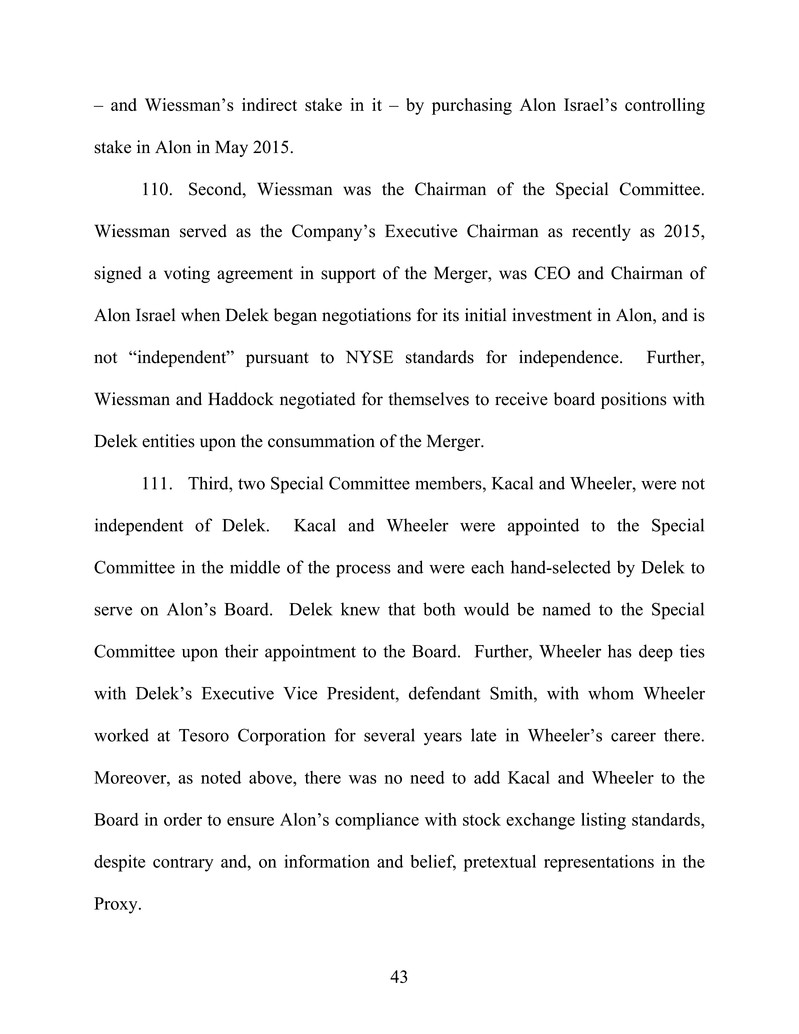
43 – and Wiessman’s indirect stake in it – by purchasing Alon Israel’s controlling stake in Alon in May 2015. 110. Second, Wiessman was the Chairman of the Special Committee. Wiessman served as the Company’s Executive Chairman as recently as 2015, signed a voting agreement in support of the Merger, was CEO and Chairman of Alon Israel when Delek began negotiations for its initial investment in Alon, and is not “independent” pursuant to NYSE standards for independence. Further, Wiessman and Haddock negotiated for themselves to receive board positions with Delek entities upon the consummation of the Merger. 111. Third, two Special Committee members, Kacal and Wheeler, were not independent of Delek. Kacal and Wheeler were appointed to the Special Committee in the middle of the process and were each hand-selected by Delek to serve on Alon’s Board. Delek knew that both would be named to the Special Committee upon their appointment to the Board. Further, Wheeler has deep ties with Delek’s Executive Vice President, defendant Smith, with whom Wheeler worked at Tesoro Corporation for several years late in Wheeler’s career there. Moreover, as noted above, there was no need to add Kacal and Wheeler to the Board in order to ensure Alon’s compliance with stock exchange listing standards, despite contrary and, on information and belief, pretextual representations in the Proxy.
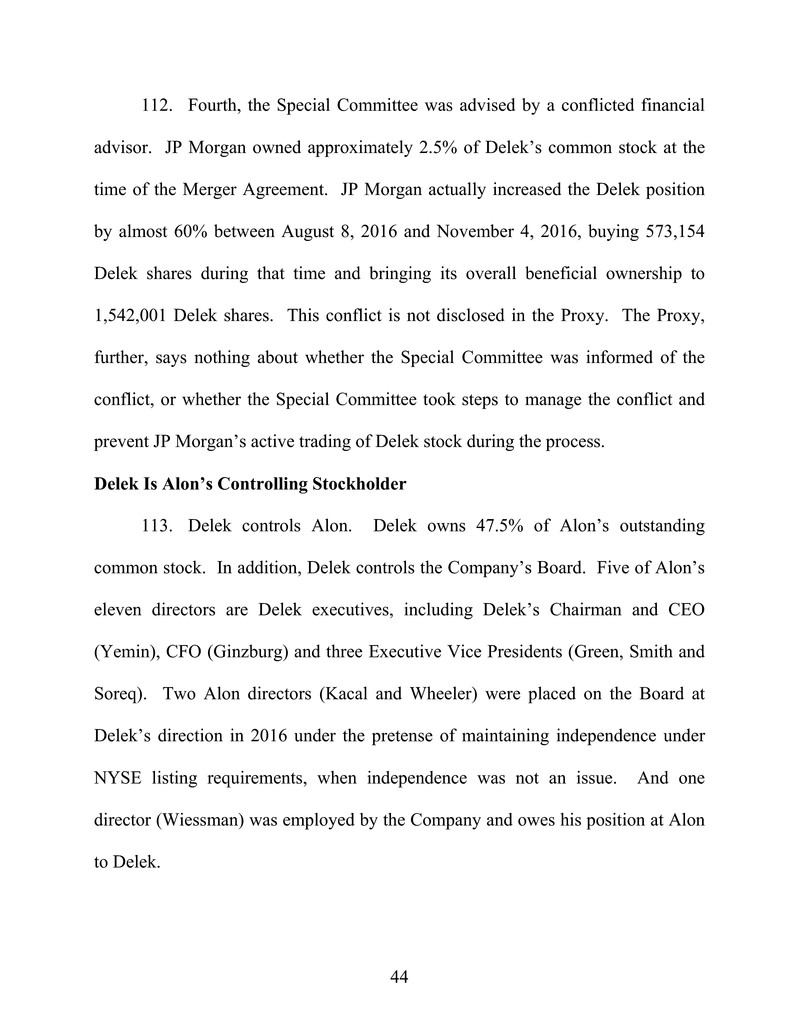
44 112. Fourth, the Special Committee was advised by a conflicted financial advisor. JP Morgan owned approximately 2.5% of Delek’s common stock at the time of the Merger Agreement. JP Morgan actually increased the Delek position by almost 60% between August 8, 2016 and November 4, 2016, buying 573,154 Delek shares during that time and bringing its overall beneficial ownership to 1,542,001 Delek shares. This conflict is not disclosed in the Proxy. The Proxy, further, says nothing about whether the Special Committee was informed of the conflict, or whether the Special Committee took steps to manage the conflict and prevent JP Morgan’s active trading of Delek stock during the process. Delek Is Alon’s Controlling Stockholder 113. Delek controls Alon. Delek owns 47.5% of Alon’s outstanding common stock. In addition, Delek controls the Company’s Board. Five of Alon’s eleven directors are Delek executives, including Delek’s Chairman and CEO (Yemin), CFO (Ginzburg) and three Executive Vice Presidents (Green, Smith and Soreq). Two Alon directors (Kacal and Wheeler) were placed on the Board at Delek’s direction in 2016 under the pretense of maintaining independence under NYSE listing requirements, when independence was not an issue. And one director (Wiessman) was employed by the Company and owes his position at Alon to Delek.
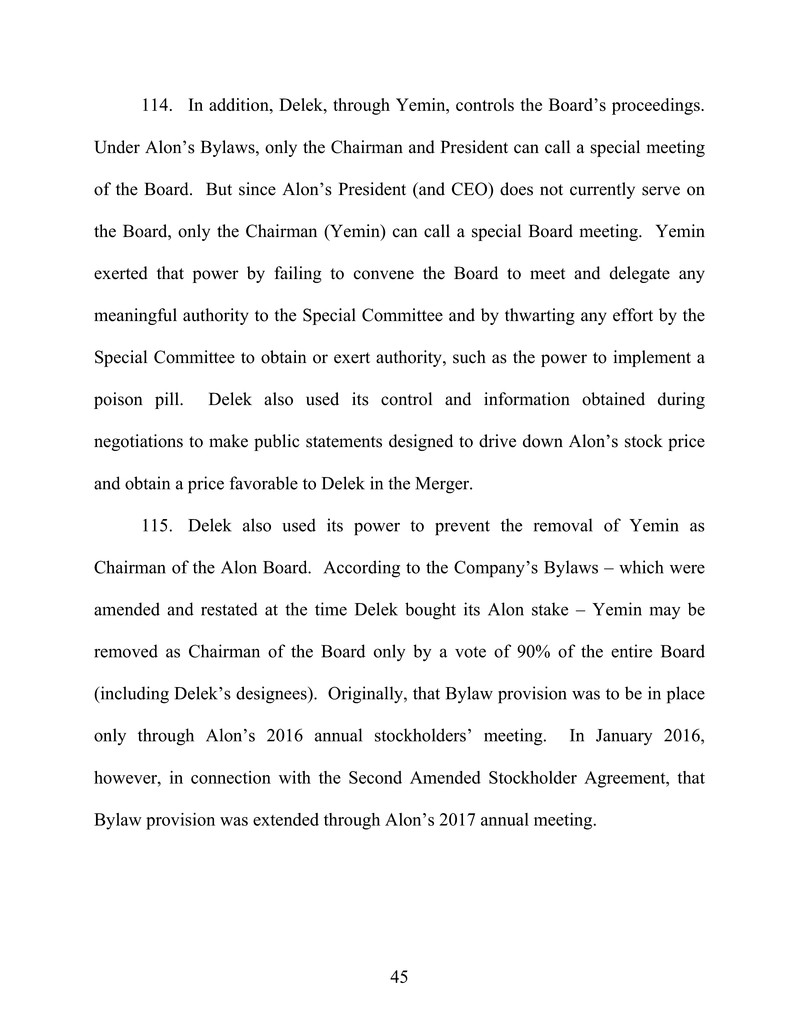
45 114. In addition, Delek, through Yemin, controls the Board’s proceedings. Under Alon’s Bylaws, only the Chairman and President can call a special meeting of the Board. But since Alon’s President (and CEO) does not currently serve on the Board, only the Chairman (Yemin) can call a special Board meeting. Yemin exerted that power by failing to convene the Board to meet and delegate any meaningful authority to the Special Committee and by thwarting any effort by the Special Committee to obtain or exert authority, such as the power to implement a poison pill. Delek also used its control and information obtained during negotiations to make public statements designed to drive down Alon’s stock price and obtain a price favorable to Delek in the Merger. 115. Delek also used its power to prevent the removal of Yemin as Chairman of the Alon Board. According to the Company’s Bylaws – which were amended and restated at the time Delek bought its Alon stake – Yemin may be removed as Chairman of the Board only by a vote of 90% of the entire Board (including Delek’s designees). Originally, that Bylaw provision was to be in place only through Alon’s 2016 annual stockholders’ meeting. In January 2016, however, in connection with the Second Amended Stockholder Agreement, that Bylaw provision was extended through Alon’s 2017 annual meeting.
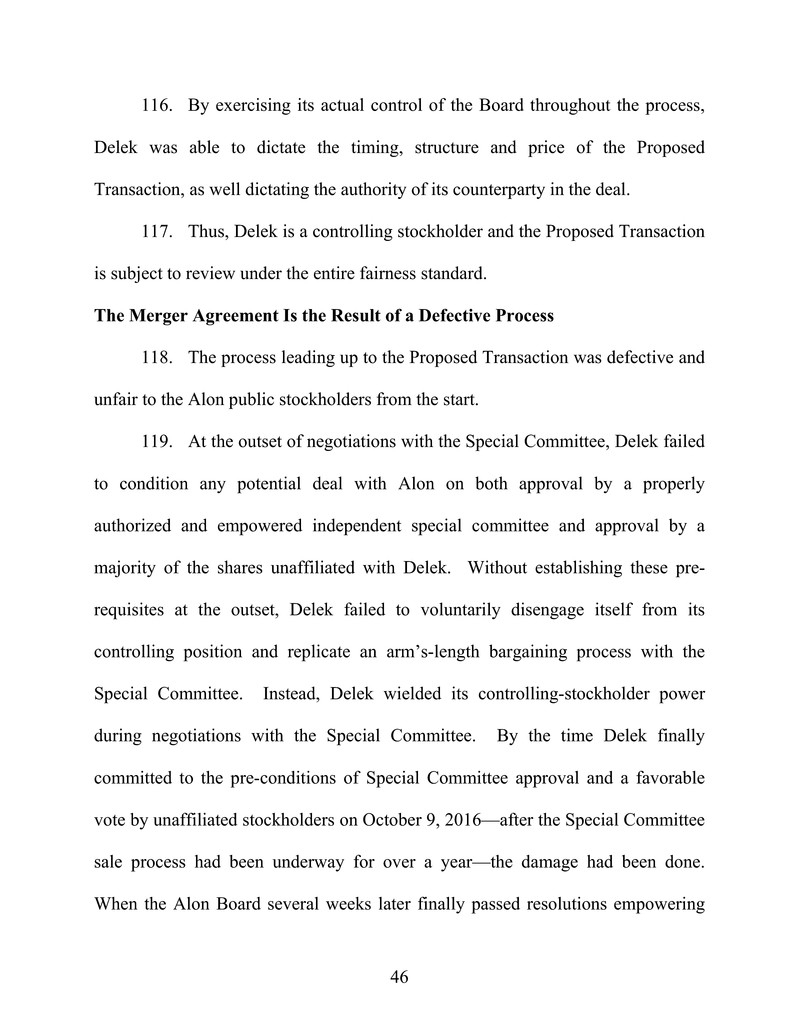
46 116. By exercising its actual control of the Board throughout the process, Delek was able to dictate the timing, structure and price of the Proposed Transaction, as well dictating the authority of its counterparty in the deal. 117. Thus, Delek is a controlling stockholder and the Proposed Transaction is subject to review under the entire fairness standard. The Merger Agreement Is the Result of a Defective Process 118. The process leading up to the Proposed Transaction was defective and unfair to the Alon public stockholders from the start. 119. At the outset of negotiations with the Special Committee, Delek failed to condition any potential deal with Alon on both approval by a properly authorized and empowered independent special committee and approval by a majority of the shares unaffiliated with Delek. Without establishing these pre- requisites at the outset, Delek failed to voluntarily disengage itself from its controlling position and replicate an arm’s-length bargaining process with the Special Committee. Instead, Delek wielded its controlling-stockholder power during negotiations with the Special Committee. By the time Delek finally committed to the pre-conditions of Special Committee approval and a favorable vote by unaffiliated stockholders on October 9, 2016—after the Special Committee sale process had been underway for over a year—the damage had been done. When the Alon Board several weeks later finally passed resolutions empowering
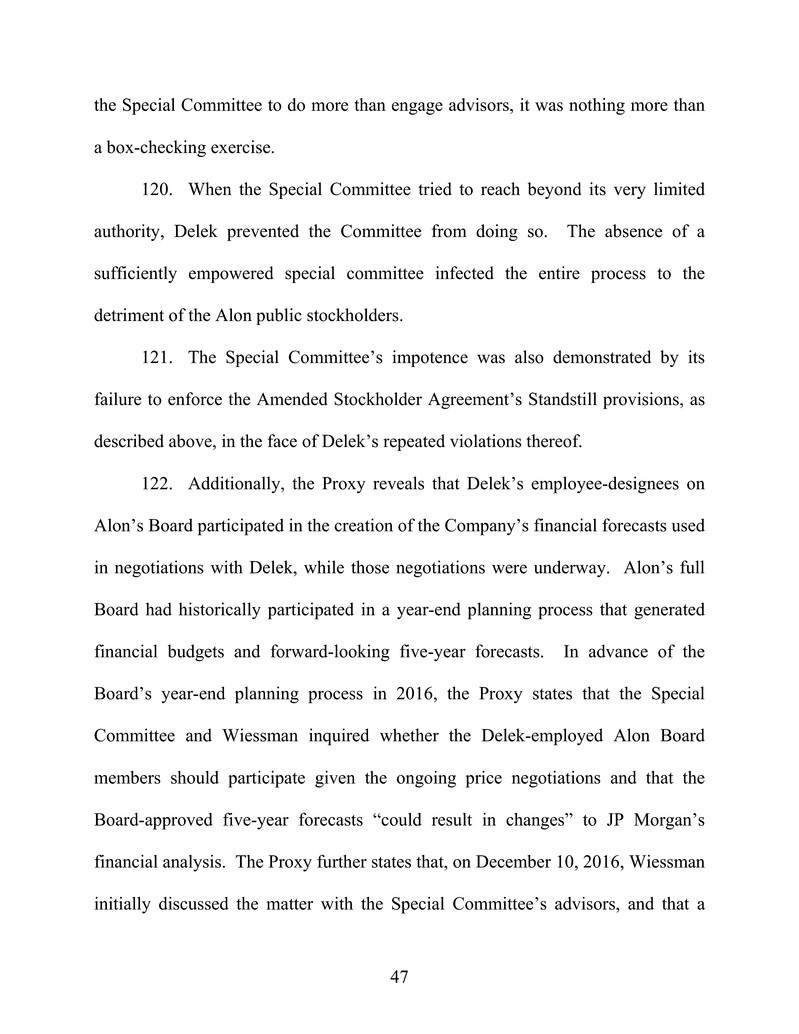
47 the Special Committee to do more than engage advisors, it was nothing more than a box-checking exercise. 120. When the Special Committee tried to reach beyond its very limited authority, Delek prevented the Committee from doing so. The absence of a sufficiently empowered special committee infected the entire process to the detriment of the Alon public stockholders. 121. The Special Committee’s impotence was also demonstrated by its failure to enforce the Amended Stockholder Agreement’s Standstill provisions, as described above, in the face of Delek’s repeated violations thereof. 122. Additionally, the Proxy reveals that Delek’s employee-designees on Alon’s Board participated in the creation of the Company’s financial forecasts used in negotiations with Delek, while those negotiations were underway. Alon’s full Board had historically participated in a year-end planning process that generated financial budgets and forward-looking five-year forecasts. In advance of the Board’s year-end planning process in 2016, the Proxy states that the Special Committee and Wiessman inquired whether the Delek-employed Alon Board members should participate given the ongoing price negotiations and that the Board-approved five-year forecasts “could result in changes” to JP Morgan’s financial analysis. The Proxy further states that, on December 10, 2016, Wiessman initially discussed the matter with the Special Committee’s advisors, and that a

48 discussion was held later that day among Delek management and outside counsel, Alon management and outside counsel, and Gibson Dunn. Following that later discussion involving Delek, “the parties determined that the full Alon Board” would participate in Alon’s 2016 year-end planning process, in accordance with historical practices. The full Board convened later that day to review and finalize Alon’s management-prepared five-year strategic plan. The Merger Consideration Is Unfairly Low 123. The Board ultimately agreed to a Merger price valued on announcement at $12.13, which is a substantial discount to the price that Delek originally paid for its Delek shares two years ago, and that price represents a meager 6.6% premium to the Company’s stock price before the Proposed Transaction was announced. 124. The value of the Proposed Transaction price is directly tied to the value of Delek stock. Yet the Alon Board did nothing to protect the Alon stockholders from a decline in Delek’s stock price, such as insisting on a “price collar” in the Merger Agreement that would have provided a minimum dollar-per- share to Alon’s public stockholders. 125. The Board’s focus on the relative valuation between Alon’s stock and Delek’s stock improperly diverted the Special Committee’s attention from where it

49 should have been: ensuring that the Alon public stockholders receive fair intrinsic value for their Alon shares in a deal with Delek. 126. To be sure, the agreed-to exchange ratio represents a price-per-share that is at or below the low end of the value ranges for Alon’s common stock that JP Morgan’s analyses derived. 127. Those implied values were driven, in large part, by Alon’s forward- looking financial projections (the “Company Projections”). In a third-party transaction, the putative buyer would have no involvement in the seller’s preparation of those financial projections. Here, however, the Proxy reflects that all five of the Delek-employed Alon Board members participated in the Board’s annual budgeting review, which generated the Company’s forward-looking projections in December 2016, in the final weeks of the negotiations when a price had not yet been agreed-to. 128. Additionally, to enable JP Morgan to conduct financial analyses based on the Company’s projections that yielded implied prices-per-share close to the as- announced value of $12.13, the Special Committee authorized projections that excluded management’s best estimates of the future impact of planned growth projects, and consequently projected less future revenue and lower future growth (the “Adjusted Company Projections”). Even then, however, JP Morgan’s financial analyses, on the whole, still fail to support the agreed-to merger price.

50 129. JP Morgan’s financial analyses included a sum-of-the-parts analysis, individually valuing each of Alon’s business segments. That analysis yielded an implied price per share for Alon’s common stock of $15.60 to $18.90, wholly above the per-share price implied by the 0.504x exchange ratio. 130. JP Morgan also performed two discounted cash flow (“DCF”) analyses which resulted in implied price ranges well above the agreed-to consideration. JP Morgan’s first DCF analysis, based on the Company Projections, yielded an implied range of $15.40 to $20.70. The second DCF analysis performed by JP Morgan, which used the Adjusted Company Projections, still yielded a value range wholly above the agreed-to price: $12.70 to $16.40. Accordingly, even using a set of projections that excluded the positive revenue impact of management’s planned growth initiatives, JP Morgan’s DCF analysis still yields a range of per-share values wholly above the agreed-to deal price. 131. Despite these financial analyses showing that $12.13 per share undervalued Alon’s shares under multiple methodologies, the Special Committee nevertheless agreed to an exchange ratio with Delek representing a discount to the true value of Alon’s publicly held shares. 132. Moreover, JP Morgan’s DCF analyses understate Alon’s per-share value for at least two additional reasons.
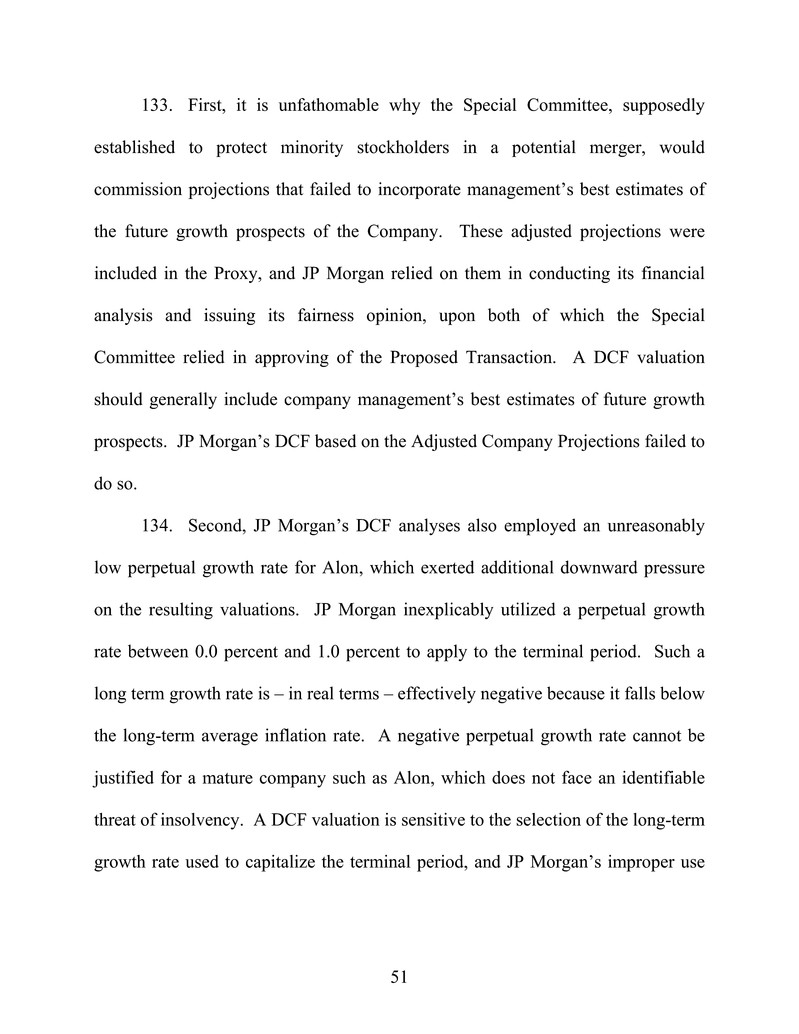
51 133. First, it is unfathomable why the Special Committee, supposedly established to protect minority stockholders in a potential merger, would commission projections that failed to incorporate management’s best estimates of the future growth prospects of the Company. These adjusted projections were included in the Proxy, and JP Morgan relied on them in conducting its financial analysis and issuing its fairness opinion, upon both of which the Special Committee relied in approving of the Proposed Transaction. A DCF valuation should generally include company management’s best estimates of future growth prospects. JP Morgan’s DCF based on the Adjusted Company Projections failed to do so. 134. Second, JP Morgan’s DCF analyses also employed an unreasonably low perpetual growth rate for Alon, which exerted additional downward pressure on the resulting valuations. JP Morgan inexplicably utilized a perpetual growth rate between 0.0 percent and 1.0 percent to apply to the terminal period. Such a long term growth rate is – in real terms – effectively negative because it falls below the long-term average inflation rate. A negative perpetual growth rate cannot be justified for a mature company such as Alon, which does not face an identifiable threat of insolvency. A DCF valuation is sensitive to the selection of the long-term growth rate used to capitalize the terminal period, and JP Morgan’s improper use

52 of an effectively negative growth rate depressed the per-share output of its DCF analyses. The Vote of Alon’s Public Stockholders Will Not Be Fully Informed 135. In addition to the instances mentioned above concerning the inadequate and materially incomplete and/or inaccurate disclosures made to Alon’s stockholders in the Proxy, the Board and Delek have failed to make full material information available to Alon’s stockholders in advance of the scheduled June 28, 2017 Special Meeting in several other respects. 136. First, the Proxy does not disclose that funds controlled by JP Morgan currently hold approximately 2.5% of Delek’s stock. Nor does the Proxy disclose that JP Morgan substantially increased its stake during the Merger negotiations. A reasonable stockholder would consider it significant that the Special Committee’s financial advisor owned stock in the controlling stockholder/acquirer and bought a substantial number of additional shares during the negotiations. 137. Second, the Proxy never discloses whether the Special Committee knew that JP Morgan controlled funds that possessed 2.5% of Delek’s shares. The Proxy represents that the Special Committee purportedly interviewed potential financial advisors on July 31, 2015. The Proxy’s discussion, however, never reveals whether the Special Committee (a) knew that JP Morgan funds owned Delek stock, or (b) knew that those funds acquired more Delek stock while the

53 Special Committee was negotiating price terms with JP Morgan’s advice. The Special Committee had a duty to inform itself of its advisors’ conflicts of interest and manage those conflicts. Alon’s stockholders would find it significant to know to what extent, if any, the Special Committee was aware of JP Morgan’s conflict of interest and what steps, if any, the Special Committee took to manage JP Morgan’s conflicts of interest. 138. Third, the Proxy makes only partial disclosures concerning Wiessman’s prospective seat on Delek’s board and Haddock’s prospective seat on the board of Delek Logistics. The Proxy states that the Special Committee specifically negotiated for both board positions and that both positons will be newly created. A December 4, 2016 draft merger agreement prepared by Alon’s counsel and Gibson Dunn proposed that Alon representatives be included in the HoldCo board. But the Proxy does not disclose (a) how or when the Special Committee determined to demand the board positions, (b) how or when the Special Committee determined that Haddock and Wiessman – the only Special Committee members that the Proxy mentions had direct contact with Delek personnel during the negotiations – would get the two board seats, or (c) any discussion at any Special Committee meeting concerning these two board seats. Additionally, while Delek’s and Delek Logistics’ SEC filings reflect that each board seat comes with six-figure annual compensation, that material information is withheld from Alon’s
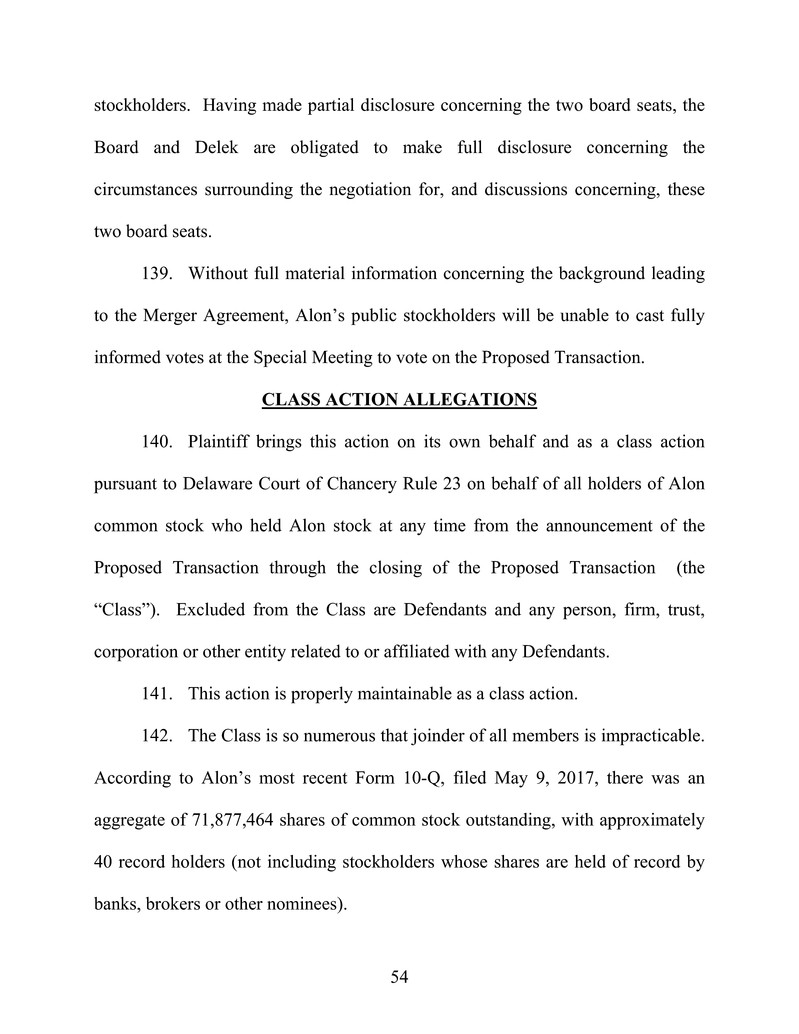
54 stockholders. Having made partial disclosure concerning the two board seats, the Board and Delek are obligated to make full disclosure concerning the circumstances surrounding the negotiation for, and discussions concerning, these two board seats. 139. Without full material information concerning the background leading to the Merger Agreement, Alon’s public stockholders will be unable to cast fully informed votes at the Special Meeting to vote on the Proposed Transaction. CLASS ACTION ALLEGATIONS 140. Plaintiff brings this action on its own behalf and as a class action pursuant to Delaware Court of Chancery Rule 23 on behalf of all holders of Alon common stock who held Alon stock at any time from the announcement of the Proposed Transaction through the closing of the Proposed Transaction (the “Class”). Excluded from the Class are Defendants and any person, firm, trust, corporation or other entity related to or affiliated with any Defendants. 141. This action is properly maintainable as a class action. 142. The Class is so numerous that joinder of all members is impracticable. According to Alon’s most recent Form 10-Q, filed May 9, 2017, there was an aggregate of 71,877,464 shares of common stock outstanding, with approximately 40 record holders (not including stockholders whose shares are held of record by banks, brokers or other nominees).

55 143. There are common questions of fact and law including, inter alia, the following: a. Whether Delek breached its fiduciary duties as a controlling stockholder to Alon’s public stockholders by orchestrating the Proposed Transaction for its own benefit; b. Whether the Director Defendants have breached and continue to breach their fiduciary duties; c. Whether the entire fairness standard applies to the Proposed Transaction; and d. Whether Plaintiff and the other members of the Class are entitled to damages. 144. Plaintiff’s claims are typical of the claims of the other members of the Class, and Plaintiff do not have any interests adverse to the Class. 145. Plaintiff is an adequate representative of the Class, has retained skilled counsel with extensive experience in litigation of this nature, and will fairly and adequately protect the interests of the Class. 146. The prosecution of separate actions by individual members of the Class would create a risk of inconsistent or varying adjudications with respect to individual members of the Class which would establish incompatible standards of conduct for the party opposing the Class.

56 147. Defendants have acted on grounds generally applicable to the Class with respect to the matters complained of herein, thereby making appropriate the relief sought herein with respect to the Class as a whole. COUNT I (Breaches of Fiduciary Duty Against Delek and the Merger Sub Defendants) 148. Plaintiff repeats and re-alleges each and every allegation contained above as if fully set forth herein. 149. As a controlling stockholder of Alon, Delek owes Plaintiff and the Class fiduciary duties of loyalty and care. 150. By the acts alleged herein, Delek has breached its fiduciary duty to Alon’s public stockholders. The Proposed Transaction was timed, structured, disclosed and priced to serve Delek’s interests at the public stockholders’ detriment. Delek wielded its position as Alon’s controlling stockholder to extract buyout terms from the Special Committee that are unfair to Plaintiff and the Class. Delek permitted a buyout process that consistently and unfairly undermined the Special Committee’s bargaining position, to the detriment of Plaintiff and the Class. 151. Delek has also breached its fiduciary duties to the Alon public stockholders as a controlling stockholder by disseminating a materially misleading
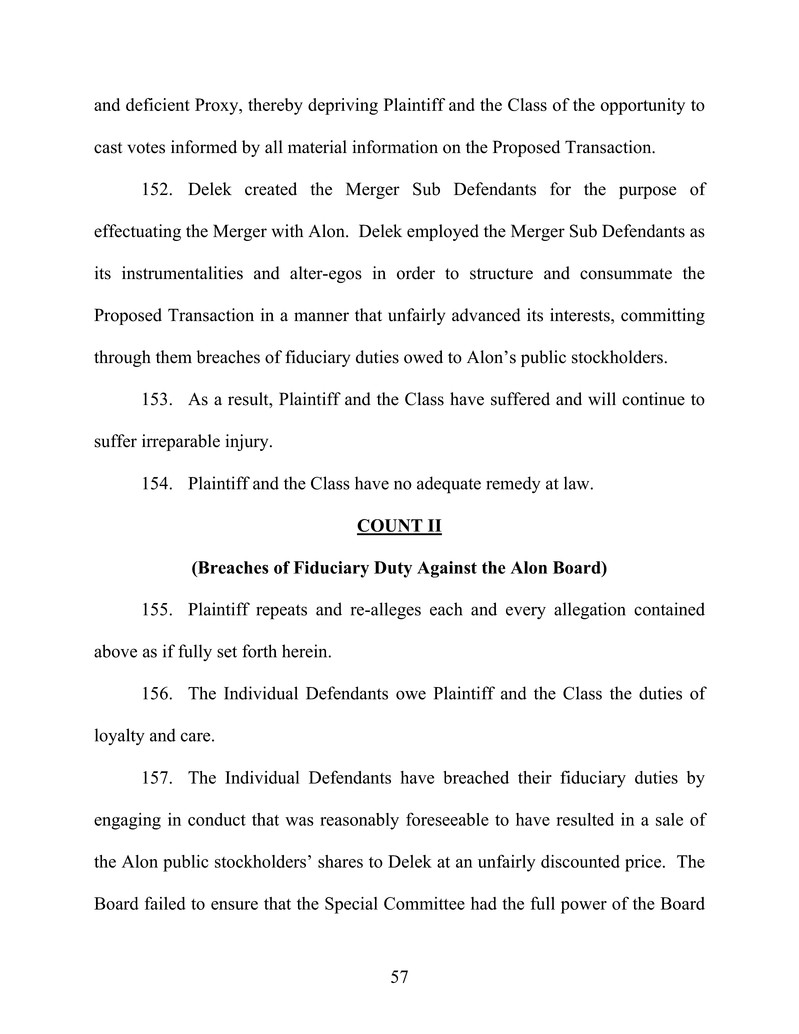
57 and deficient Proxy, thereby depriving Plaintiff and the Class of the opportunity to cast votes informed by all material information on the Proposed Transaction. 152. Delek created the Merger Sub Defendants for the purpose of effectuating the Merger with Alon. Delek employed the Merger Sub Defendants as its instrumentalities and alter-egos in order to structure and consummate the Proposed Transaction in a manner that unfairly advanced its interests, committing through them breaches of fiduciary duties owed to Alon’s public stockholders. 153. As a result, Plaintiff and the Class have suffered and will continue to suffer irreparable injury. 154. Plaintiff and the Class have no adequate remedy at law. COUNT II (Breaches of Fiduciary Duty Against the Alon Board) 155. Plaintiff repeats and re-alleges each and every allegation contained above as if fully set forth herein. 156. The Individual Defendants owe Plaintiff and the Class the duties of loyalty and care. 157. The Individual Defendants have breached their fiduciary duties by engaging in conduct that was reasonably foreseeable to have resulted in a sale of the Alon public stockholders’ shares to Delek at an unfairly discounted price. The Board failed to ensure that the Special Committee had the full power of the Board
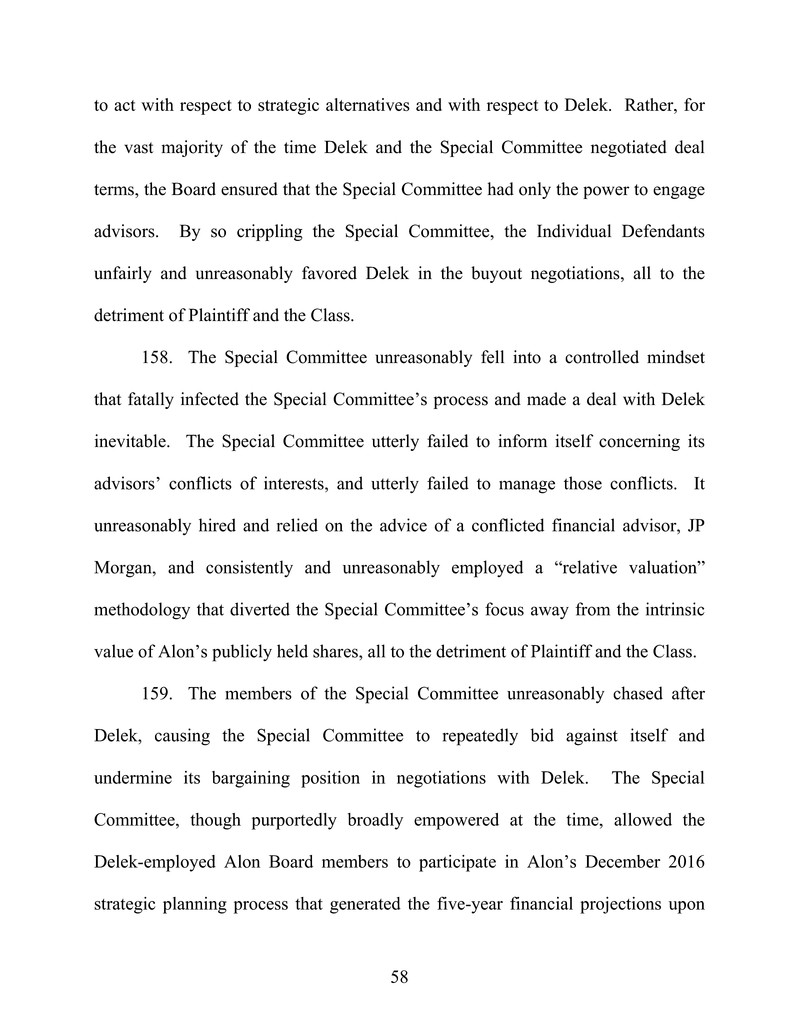
58 to act with respect to strategic alternatives and with respect to Delek. Rather, for the vast majority of the time Delek and the Special Committee negotiated deal terms, the Board ensured that the Special Committee had only the power to engage advisors. By so crippling the Special Committee, the Individual Defendants unfairly and unreasonably favored Delek in the buyout negotiations, all to the detriment of Plaintiff and the Class. 158. The Special Committee unreasonably fell into a controlled mindset that fatally infected the Special Committee’s process and made a deal with Delek inevitable. The Special Committee utterly failed to inform itself concerning its advisors’ conflicts of interests, and utterly failed to manage those conflicts. It unreasonably hired and relied on the advice of a conflicted financial advisor, JP Morgan, and consistently and unreasonably employed a “relative valuation” methodology that diverted the Special Committee’s focus away from the intrinsic value of Alon’s publicly held shares, all to the detriment of Plaintiff and the Class. 159. The members of the Special Committee unreasonably chased after Delek, causing the Special Committee to repeatedly bid against itself and undermine its bargaining position in negotiations with Delek. The Special Committee, though purportedly broadly empowered at the time, allowed the Delek-employed Alon Board members to participate in Alon’s December 2016 strategic planning process that generated the five-year financial projections upon
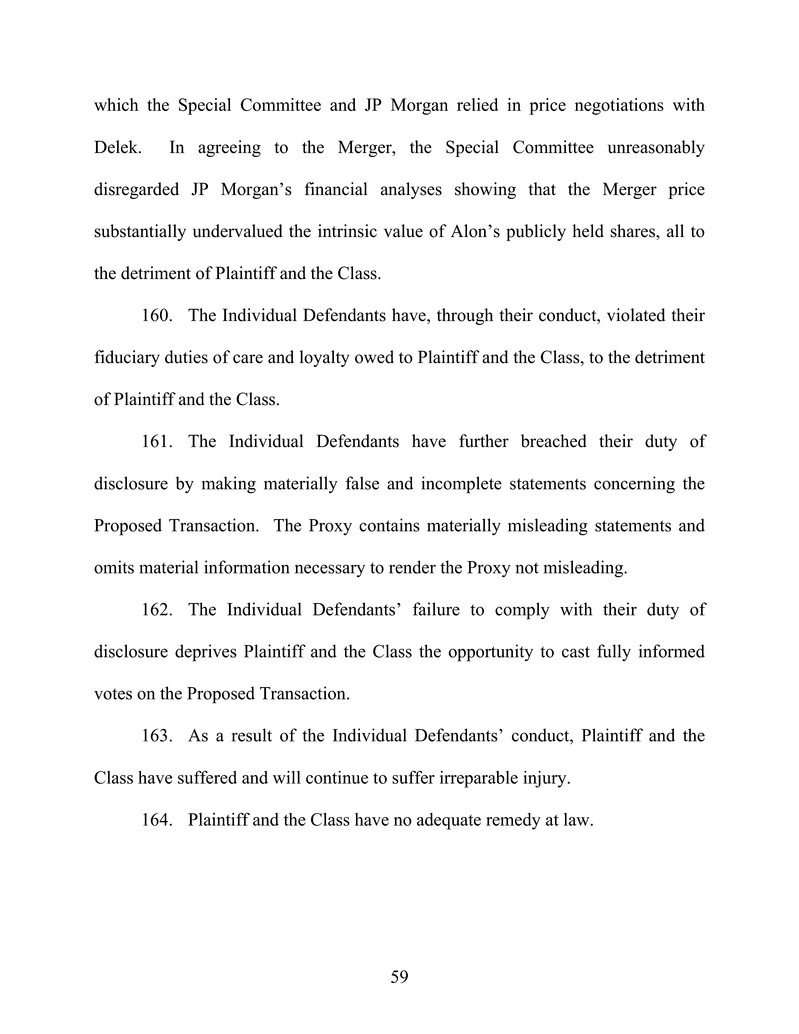
59 which the Special Committee and JP Morgan relied in price negotiations with Delek. In agreeing to the Merger, the Special Committee unreasonably disregarded JP Morgan’s financial analyses showing that the Merger price substantially undervalued the intrinsic value of Alon’s publicly held shares, all to the detriment of Plaintiff and the Class. 160. The Individual Defendants have, through their conduct, violated their fiduciary duties of care and loyalty owed to Plaintiff and the Class, to the detriment of Plaintiff and the Class. 161. The Individual Defendants have further breached their duty of disclosure by making materially false and incomplete statements concerning the Proposed Transaction. The Proxy contains materially misleading statements and omits material information necessary to render the Proxy not misleading. 162. The Individual Defendants’ failure to comply with their duty of disclosure deprives Plaintiff and the Class the opportunity to cast fully informed votes on the Proposed Transaction. 163. As a result of the Individual Defendants’ conduct, Plaintiff and the Class have suffered and will continue to suffer irreparable injury. 164. Plaintiff and the Class have no adequate remedy at law.

60 PRAYER FOR RELIEF WHEREFORE, Plaintiff demands relief in its favor and in favor of the Class and against all Defendants as follows: A. Declaring that the action is properly maintainable as a class action, and certifying Plaintiff as Class representative and Plaintiff’s counsel as class counsel; B. Declaring that Defendants have breached their fiduciary duties owed to Plaintiff and the Class; or C. Awarding rescissory or other damages to Plaintiff and the Class and against all Defendants for all losses and damages suffered as a result of Defendants’ wrongdoing alleged herein, in an amount to be determined at trial, together with interest thereon; D. Awarding to Plaintiff and the Class additional shares of Delek common stock through an adjusted exchange ratio to reimburse for damages that will be suffered in the event that the Proposed Transaction is consummated; E. Awarding Plaintiff the costs and disbursements of this action, including reasonable attorneys’ and experts’ fees; and
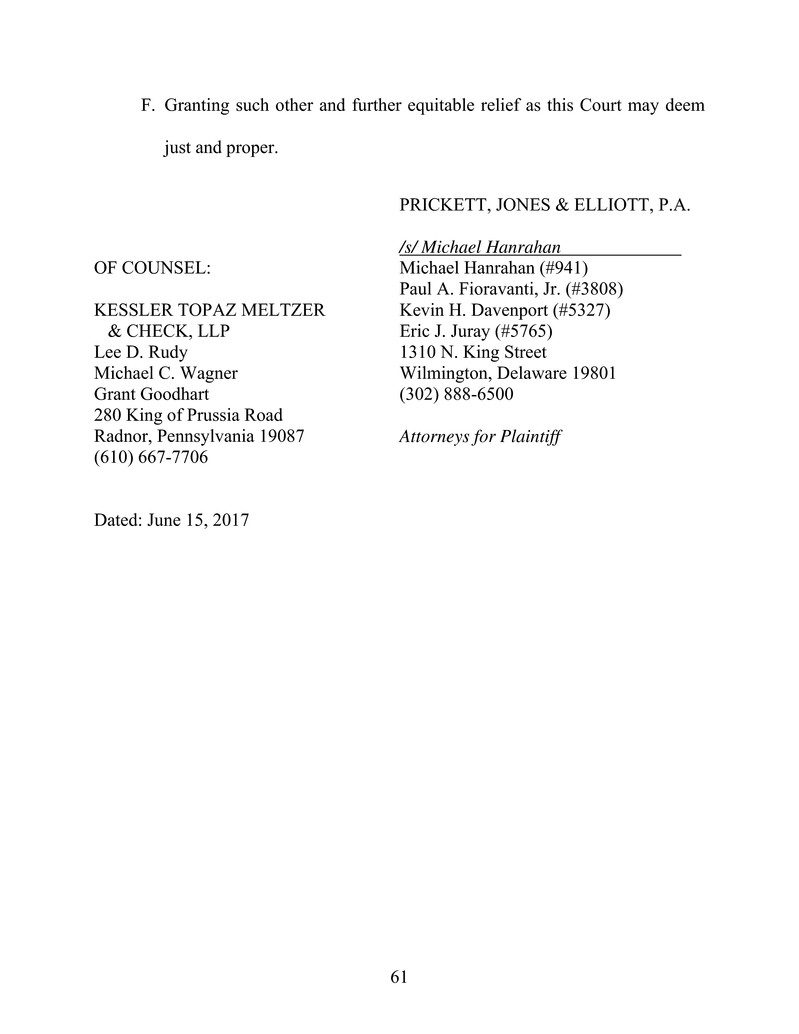
61 F. Granting such other and further equitable relief as this Court may deem just and proper. OF COUNSEL: KESSLER TOPAZ MELTZER & CHECK, LLP Lee D. Rudy Michael C. Wagner Grant Goodhart 280 King of Prussia Road Radnor, Pennsylvania 19087 (610) 667-7706 PRICKETT, JONES & ELLIOTT, P.A. /s/ Michael Hanrahan Michael Hanrahan (#941) Paul A. Fioravanti, Jr. (#3808) Kevin H. Davenport (#5327) Eric J. Juray (#5765) 1310 N. King Street Wilmington, Delaware 19801 (302) 888-6500 Attorneys for Plaintiff Dated: June 15, 2017




























































